#in the books which was...... capitalistic at best
Explore tagged Tumblr posts
Text
so i've been listening to the audiobooks of the hunger games series and decided i should watch the movies, which i've never done before, and uhhhhhhh these movies suck dude
#like i've read the books before but GOD they hit so much harder than the movies#and i think the fact that they're written in first person makes it hard to translate to screen#but they did a real bad job of it#like i already kind of had something against the movies bc they basically went after the 'love triangle' the same way the capitol did#in the books which was...... capitalistic at best#but like watching the movies i'm like bro#where's the PASSION?#where's the FIRE?#where's the HEARTBREAK?#THE STARTING A FUCKING REVOLUTION?#good job hollywood you lameified one of the only genuinely good ya series#the hunger games
5 notes
·
View notes
Text
it’s really funny that taylor has adopted a reputation for being well-read and book smart because every time she opens her mouth about a real world issue i am forcibly reminded that she stopped going into school after 10th grade (her words), and even then, her formal education was provided by the state of tennessee.

because… what?
to frame patriarchy as this inherent thing that has ALWAYS existed and is as naturally occurring as a blue sky, is just not true. and to frame capitalism as this thing that is inherent is also just… not true. i could never unpack in just a post why those claims are ahistorical, but i will say that it is fucking nuts to look at an issue of capitalism and say “yeah it’s a problem, but, well, i’m just going to win at it 🤩” and call it feminism.
and that is the problem with white feminism. it just turns into idiots trying to speak on single topics and cherry pick their agendas, even though, in a sociopolitical or socioeconomic sense, it doesn’t work like that. you cannot talk about feminism without discussing western society, organized religion, global superpowers, communities of color, colonization, climate change, corporations, monopolies and more. anything less is useless at best and misleading at worst.
(because when you don’t, you get brain dead hot takes like “patriarchy has existed since the dawn of time, and so has money!”)
it’s like how greta thunberg said that she started as just a climate change activist, but now she’s basically a total anti-capitalist advocating for a complete disruption and overthrow to the way the world currently runs because she realized that advocating for that and advocating for climate justice are one and the same.
and if you criticize taylor swift for talking out of her ass, you’ll be hit with brainwashed swifties throwing out the word “misogyny” or “you’d never ask another celebrity this” or “you’re holding her to her own standards” because they’ve been hearing taylor’s bullshit feminism for so long that now they’ve adopted it as their own
taylor’s feminism will NEVER surpass the self-serving role it fills in her life because to do so would mean confronting the bigotry she has upheld, the questionable people she spends her time with, the wealth she is hoarding, her impact on the environment, and much more.
which is… fine, i guess. she doesn’t have to be a good feminist. but in that case she needs to pick a side and shut her fucking mouth about it. because letting her romp around spewing out the most egocentric and individualistic interpretations of it is boring and unhelpful.
#*#i knew that quote kept sticking out to me#like girl what the hell#taylor swift#time magazine#person of the year#white feminism
2K notes
·
View notes
Text
Winning coalitions aren't always governing coalitions
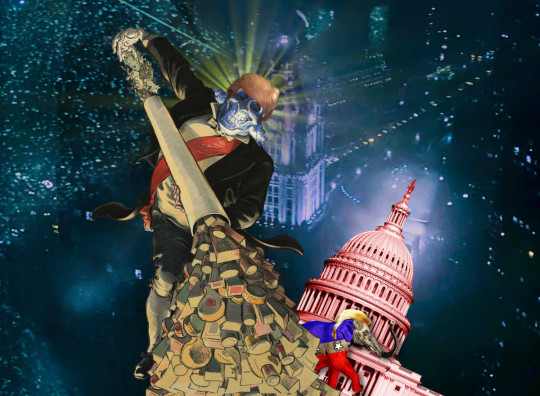
If you'd like an essay-formatted version of this post to read or share, here's a link to it on pluralistic.net, my surveillance-free, ad-free, tracker-free blog:
https://pluralistic.net/2025/01/06/how-the-sausage-gets-made/#governing-is-harder

Winning an election is easier than it looks: all you have to do is convince a bunch of different groups that you will use power to achieve their desires. Bonus points if you can convince groups with mutually exclusive goals that you'll deliver for them – the coalition of "people who disagree about everything" is hard to assemble, but it sure is large!
Politically, a "conservative" is someone who believes that there is a small group of people who were born to rule, and a much larger group of people who were born to be ruled over. As Corey Robin writes in The Reactionary Mind, this is the one trait that unifies all the disparate strains of conservative thought: imperialists, monarchists, capitalists, white supremacists, misogynists, Christian nationalists, Hindu nationalists and supporters of Israeli genocide in Palestine:
https://coreyrobin.com/books/the-reactionary-mind/
These groups all agree that power should be hierarchical, that your position in a hierarchy is something you're born with, and that letting people who were "meant" to be at the bottom of the hierarchy rise to the top puts society so out of balance that it's actually a threat to human survival. That's why conservatives of all stripes get so furious about "DEI" – any kind of affirmative action program serves as a defective sorting hat, putting the incompetent and unsuitable into positions of power over other peoples' lives. It's why "DEI" is the go-to scapegoat for any kind of disaster, including giant ships crashing into bridges:
https://www.axios.com/local/salt-lake-city/2024/03/26/baltimore-bridge-dei-utah-lawmaker-phil-lyman-misinformation
But while conservatives all agree that some of us are born to be in charge and others are born to be bossed around by our innate superiors, they have irreconcilable differences about who is meant to be in charge. British imperialists who pine for the Raj have views that are fundamentally at odds with the views of Hindu nationalists. They're both "conservative" movements, but they're actually bitter enemies.
For a conservative movement to win power, it has to convince the people whom it would relegate to the bottom of the hierarchy to support that goal (AKA "getting turkeys to vote for Christmas"); and it must convince other conservatives that they will be able to establish a hierarchy that accommodates multiple, co-equal ruling elites.
The first tactic is well-established. LBJ summed it up neatly:
If you can convince the lowest white man he's better than the best colored man, he won't notice you're picking his pocket. Hell, give him somebody to look down on, and he'll empty his pockets for you.
The second one requires far more tactical thinking. Some elite groups are able to form coalitions by carving out exclusive zones: think of the friendly feeling among Modi, Orban, Erdogan, bin Salman, Trump, Milei, et al. These people all aspire to dictatorship, all espouse their superior blood – a source of personal and racial superiority – and hypothetically all believe that the world would be better if everyone (including their foreign counterparts) would take their orders.
One way to resolve this tension is to carve up the world geographically, which is why so many despots who seized power by promising to build ethno-states can co-exist with one another and even cheer one another on. Let Orban have Hungary, give Turkey to Erdogan, and let Bibi Netanyahu annex all of Gaza. Sure, in their hearts of hearts, each of these men secretly believe themselves to be racially and personally superior to the others, but so long as they all stay out of one another's turf, there's no reason to make a big deal out of that.
Another way to resolve this tension is to carve up the world temporally: think of the alliance between Christian nationalists and Israeli genocidiers. In the USA, "Christian Zionists" outnumber Jews who identify as Zionists:
https://www.trtworld.com/magazine/qanda-for-every-1-jewish-zionist-there-are-30-christian-zionists-and-netanyahu-exploits-this-15656249
But Christian Zionists aren't philosemites. They hate Jews and believe that we are all going to hell for murdering Christ. Their support for Israel isn't grounded in a belief in the necessity of a Jewish ethno-state – it arises out of the apocalyptic belief that Christ will return once Jews "return to the Holy Land" – albeit only briefly, before being cast into a lake of fire for all eternity.
Like British imperialists and the Hindu nationalists, Christian Zionists and Jewish Zionists are not on the same side. However, unlike British imperialists and Hindu nationalists, Christian Zionists and Jewish Zionists want the same thing…for a while. Both groups support the establishment of a Jewish entho-state in Israel, they just differ sharply as to what happens after that comes to pass. So long as they don't dwell on that moment in the future, they can stand shoulder to shoulder, fighting together for an Israeli state that operates with absolute US support and total international impunity.
Coalitions who defer the question of how they'll use power to after they've gained power are using time (rather than space) as a buffer that keeps their differences from smashing together until they shatter. But time and space aren't the only buffers for the differences between coalition partners – there's also class.
"Class" has been the most important, most useful buffer for conservativism since the Reagan revolution. Reagan came to power by forging an alliance with evangelicals, whose cult leaders had historically demanded that members focus their energies (and cash donations) on the church, while avoiding politics as "worldly."
Reagan promised the Christian right a bunch of culture war stuff – bans on abortion, punishment for uppity women and racial minorities, prayer in school, segregation academies, etc – that his financial backers frankly didn't give a shit about. By all means, let working class evangelicals homeschool their kids and teach them that the Earth is 5,000 years old, it doesn't matter to Wall Street, who will reap a giant tax-cut and also send their kids to private schools with rigorous curriculum. Bankers' wives and daughters will always be able to afford to fly out of state (or across the border) for abortion care, they will never die of AIDS in the charity wing of a community hospital, their daughters won't be trapped by bans on no-fault divorces.
For the past 40 years, American oligarchs and would-be oligarchs have entered into enthusiastic coalitions with virulently racist, sexist and homophobic groups, and maintained peace within their coalition by passing punitive, cruel laws that the rich can buy their way around. For many self-styled libertarians, the most important liberty is "not paying taxes" and this subordinates all other liberties, such that a "libertarian" will vote for a coalition whose platform promises to ban abortion, birth control, "interracial" marriage, and queer sex, so long as it also promises tax cuts. It's a weird kind of pro-freedom ideology that happily trades away (others') freedom for (your own) tax cuts:
https://pluralistic.net/2021/09/29/jubilance/#tolerable-racism
Remember, Trump's first CPAC speech was sponsored by Goproud, a group of "fiscally responsible" gay Republicans who believed in gay rights, sure, but not as much as they believed in getting so rich that even if poor gay people were ground into dust, they could float above it all:
https://en.wikipedia.org/wiki/GOProud
Class is the third buffer between the oligarchs of the right and the mass movement that provides the bulk for winning elections. After all, laws are for the little people, so by all means, we can promise – and even deliver – laws that we would never submit to, because we don't have to submit to them. This is Wilhoit's Law in action:
Conservatism consists of exactly one proposition, to wit: There must be in-groups whom the law protects but does not bind, alongside out-groups whom the law binds but does not protect.
https://en.wikipedia.org/wiki/Francis_M._Wilhoit#Wilhoit's_law
In a hierarchical society, class separates groups of people just as rigidly as time and space, and is every bit as useful a buffer as the other two forces.
Until it isn't.
Eventually – once you've banned abortion, once you've taken all the "controversial" books out of the library, once you've made affirmative action illegal – you reach the layer of non-negotiable culture war demands that the rich can't buy their way out of.
Like immigration.
Let's start with this: immigration doesn't have to result in wage suppression. Couple immigration with strong unions and a muscular labor rights regime and workers do just great. The more the merrier! America needs workers of every kind. What's more, the unions and labor laws in America owe their existence to immigrant workers, so there's nothing about immigration that is necessarily incompatible with winning rights for workers.
But the possibility of importing some overseas union organizers isn't what motivates the finance wing of the conservative coalition to demand "guest-worker" programs like the H1B visa:
https://twitter.com/RobertMSterling/status/1873175206073626660
H1B visas are "non-immigrant" visas, meaning that they are designed not to offer any path to permanent residence or citizenship. You can live in the US for a long time on an H1B, but you are bound over to your employer like a serf bound to a feudal estate: if you lose your job, you lose your right to abide in the country. That can mean losing your house, your car, your kids' school and friends. It can cost your spouse their job, because if you're kicked out of the country, they might well leave along with you, rather than remain alone here.
H1B tech workers are the workers that tech-barons have dreamt of for decades. An H1B worker can't job-hop, and so needn't be lured to work with gourmet cafeterias, luxury gymnasiums, or other perks of the whimsical tech "campus." H1B workers can't quit if they don't like their stock-options packages:
https://pluralistic.net/2023/09/10/the-proletarianization-of-tech-workers/
Tech bosses hate tech workers, and they always have. It's not affection that causes Jeff Bezos to allow his coders to come to work with pink mohawks, facial piercings, and black t-shirts that say things their bosses don't understand, while his delivery drivers piss in bottles and his warehouse workers are injured at three times the national average. Jeff Bezos neither cherishes his coders' kidneys, nor is he especially hostile to delivery drivers' need to pee – he just squeezes any and every worker in any and every way he can.
Same for Tim Cook: the accomplishment that prompted Apple's board to elevate Cook to Steve Jobs' CEO office was the successful transfer of iPhone manufacturing to China. Specifically, Cook figured out how to work with his primary supplier, Foxconn, to create a working environment that produced reliable, precision-manufactured mobile devices, and all it took was creating a working environment so brutal that the company had to install suicide nets to catch the factory workers who couldn't stand it any longer:
https://www.theguardian.com/technology/2017/jun/18/foxconn-life-death-forbidden-city-longhua-suicide-apple-iphone-brian-merchant-one-device-extract
Apple's tech workers aren't worked to suicidal desperation, sure – but not because Tim Cook likes coders and hates factory workers. It's because he's afraid coders will quit, and he's not worried about replacing factory workers after they jump to their death.
The point of the H1B program is to create a tech workforce that bosses no longer have to fear. Recall that when Elon Musk took over Twitter and circulated a mandatory "extremely hardcore" pledge that demanded that workers promise to subordinate their health and wellbeing to his profits, it prompted a mass departure, with the notable exception of workers whose immigration status (and/or insurance for serious health issues) depended on their ongoing employment at Twitter:
https://www.theverge.com/2022/11/16/23462026/elon-musk-twitter-email-hardcore-or-severance
When Musk's cronies gloated about shedding 20% of Twitter's workforce on "day zero," the workers they had in mind were the ones who didn't fear their bosses and wouldn't frog when the investor class shouted jump. "Sharpen your blades, boys" means we're slicing off workers who are laboring under the misapprehension that they are entitled to a say in their working conditions:
https://techcrunch.com/2022/09/29/elon-musk-texts-discovery-twitter/
After all, America does not have a tech worker shortage. The US tech sector fired 260,000 skilled workers in 2023, and more than 150,000 were shown the door in 2024. When Musk and his fellow tech bosses complain that they need more "talent," what they mean is they need workers who are so terrified of being deported that they'll accept low wages, sleep under their desks, refuse to talk to union organizers, and, above all, do as they're told:
https://youtube.com/shorts/N0FkyXFhmpo?si=GCh6bFqd31prazhz
Trump won office by promising mutually exclusive outcomes to different parts of his coalition. To the nativists and bigots (and workers who'd bamboozled into thinking that their low salaries were the fault of other workers, not their bosses), he promised a halt to immigration. To the plutocrats, he promised a large and pliable workforce – of low-waged agricultural workers and of precarious H1B tech workers who'd discipline America's "entitled" tech workers:
https://prospect.org/labor/2025-01-02-president-musk-american-workers-h1b-visas/
Now, he has to figure out how to keep everyone happy. Literally: the Speakership of Congress is only nine votes away from collapsing at any time (and until last week, it was just one vote away), and without Congress, Trump's ability to govern will be severely curtailed (see, for example, 2018-2020).
Immigration isn't an issue like abortion: oligarchs can support abortion bans and still procure abortions when they need them. It's much harder to support an immigration ban and still procure precarious, low-waged workers for your business. It will take many years for American-born workers to be so brutalized and broken that they capitulate to the working conditions that American guest workers and undocumented workers accept, and bosses are impatient.
It's hard to put on a convincing performance of banning immigration, as the UK's New Labour discovered. In the years leading up to the 2010 election, Labour – under Blair and then Brown – made a big show of "cracking down on immigration." At one point, Home Secretary Jacqui Smith announced that she was axing dozens of UK visa categories, while carefully not mentioning these were so niche that hardly anyone qualified for them. This created chaos for the people affected and their families – I lost my own "Highly Skilled Migrant" visa at this time and we had to move our wedding plans up by eight months so I could stay in the country with my British partner and our daughter – but it didn't do anything to quench the xenophobic rage that UKIP and the Tories had been stoking, and Labour lost its next election.
American conservatives are rightly proud of their ability to form coalitions. They trumpet their ethic of "no enemies to the right" and contrast this with the "cancel culture" of progressives:
https://www.wired.com/story/the-year-democrats-lost-the-internet/
It's true that purging your ranks of coalition partners who disagree with you at the margins is a severely self-limiting move. It's also true that the broader your coalition is, the easier it is to win power.
The right has built a coalition of people who want opposite things. Infamously, Project 2025 isn't just a collection of terrifying ideas for running (and ruining) America – it's a collection of mutually exclusive terrifying ideas for running and ruining America:
https://pluralistic.net/2024/07/14/fracture-lines/#disassembly-manual
Trump's top health picks – RFK jr, Weldon, Oz, Makary, Bhattacharya, Nesheiwat – want mutually exclusive, irreconcilable things that are as impossible to compromise on as "banning immigration" while simultaneously "expanding the H1B program":
https://pluralistic.net/2024/12/20/clinical-trial-by-ordeal/#spoiled-his-brand-new-rattle
Big, diverse coalitions of people who normally oppose each other are great for winning power, but they're very bad for wielding power. Trump's majorities in Congress and the Senate are razor-thin, and while the Democrats had to suffer under the Manchin-Synematic Universe, the GOP's Klown Kar of Krazies has dozens of swivel-eyed loons who will happily blow up "must-pass" bills just for shits and giggles.
What's more, the GOP has spent decades installing easily blown circuit breakers into the American legislative and administrative systems, from the filibuster to the debt ceiling. By design, these allow small groups of lawmakers to kill bills and hamstring presidential power. Trump's first attempt at removing one of these breakers – the senseless kabuki of the annual debt ceiling showdown – was a total failure:
https://prospect.org/blogs-and-newsletters/tap/2024-12-19-debt-limit-should-absolutely-be-eliminated/
Musk thinks he can ram through policies that sizable portions of the GOP coalition would rather die than support. So far, Trump has proven a pliable puppet for Musk's ambitions. But the Musk-Trump coalition is every bit as fragile as any other in the GOP, and Trump is notoriously sensitive to accusations of weakness. Musk can threaten to primary any GOP lawmaker who gets in his way, but as the Kochs discovered after they unleashed the Tea Party, grievance-fueled, paranoid, heavily armed cults are hard to keep on a leash.
The coming months are sure to be an all-out war of GOP infighting as the coalition must wield power without the useful buffers of space, time and class. They'll be an object lesson in the dangers of a coalition that's so broad that everyone is welcome, even people who'd happily line you and yours in front of a firing squad.
But just because the right's attitude to coalitions is to have a mind so open its brains fall out, that doesn't mean the left should pursue a program of overwhelming ideological purity. Trump is a stupid guy with incoherent ideas, but look at how far he got by erecting such a big tent that anyone fit underneath it (even actual Nazis).
The progressive coalition doesn't need to be that big. We can have enemies to the right. The hugs Kamala Harris bestowed on ghouls like Liz Cheney didn't win the election, and the medal Biden just gave her won't help either:
https://www.nytimes.com/2025/01/02/us/politics/presidential-citizens-medal-liz-cheney.html
Manchin and Synema can "fuck off until they come up to a gate with a sign saying 'You Can’t Fuck Off Past Here,' Climb over the gate, dream the impossible dream, and keep fucking off forever":
https://michaelmarshallsmith.substack.com/about
But the fact that some people don't belong in a progressive coalition, it doesn't follow that there's no room to make the coalition looser and broader. Sure, a big coalition makes it hard to wield power, but without that coalition, we'll never win power.
#pluralistic#coalitions#political science#gop#h1bs#immigration#no enemies to the left#no enemies to the right#conservativism#josh ganz#corey robin#the reactionary mind#project 2025#poli sci
303 notes
·
View notes
Text
Random whb characters when MC is stressed about exams
In honor of my exams this year
Satan
He could feel you being a bit on edge every once in a while and whenever Ppyong left for the human world you would ask he got you some notebooks, which he found absurd
Why are you studying at a time like this? We're in a middle of a war! Why are you reading Morometii?!
Satan yanks your book from your hands
Mc: I need that! Give it back!
Satan: No! Mc! You understand that if you die in this war you're not going to take any exam!
Mc: Don't threaten me with a fun time
Satan: Suicide is not an option I'm ever giving you.
Gamigin
He can sense you're worrying about something, his nurse senses tingling
You can't hide anything from him, especially when it comes to your health
He'll lightly scold you for putting your wellbeing on the line for an exam, but he tries to understand the feeling better
If it's something to do with anatomy he'll help! And if he doesn't understand something he just takes it to Lucifer.
If it's about anything else, he'll listen to you. He's quite a swift learner, so he makes for the perfect student
MC: It's a story about loneliness and being crushed by the expectations of a grim capitalist society
Gamigin: Damn... why do you have to learn such things?
MC: So we're prepared for adulthood
Gamigin: You should move to Paradise Lost. We don't have this capitalism you speak of. I'll ask big brother Lucifer if he's ok with us sharing a bed!
Mammon
His master is stressed and now his protective insticts are kicking in
When you explain to him you're scared about exams, he'll be more confused than anything
Why are you even studying? He already owns everything and you own him. Why even bother learning to get a job
You try to explain that you need the diploma and that's when he gets it
You're greedy for grades and knowledge. Got it!
He hires the best tutors in the whole of hell to come mentor you. He also asks Buer to help relax you with massages and yoga. He's not entirely sure how they work, but they seem affective
He'll make sure that you don't just bury yourself in your studies and actually go outside and socialise every day
He is not combating the sugar daddy allegations
Mammon: How was your tutoring today, master?
MC: Really nice, but I'm exhausted...
Mammon: It's alright, I hired the best relaxation professionals to help you out. Something about taking away dark spirits.
MC: I think you got scamed by a cult...
Mammon: That's silly! I know Buer and he's very trustworthy. Should I carry you to your appoitment?
MC: Yes, please!
Asmodeus
Ah, yes, school, he forgot you had to do that
Well, he's a believer in learning by doing
If it's something practicle, he'll just put you in a situation where you have to deal with the problem discribed in your notebook
If it's something theoretical he's actually quite a smart guy, he'll help you out.
He'll play the devils advocate in every situation or try to confuse you. If you can outwit a skeptic you trully know what you're doing
He's surprisingly unsexual in these situations. Sure, he gropes you and insists on either cuddling or sitting on his lap, but he doesn't activate his charm until you're done
After all, he needs to show you he's the best mate you'll ever have by showcasing his vast knowledge of humanitarian studies
After he feels you've finished your lesson, he'll gladly take his pay and teach your virgin body knew pleasures. But he can be patient if it's for his mate
Asmodeus: So? What answer did you get for 57?
MC: It's B
Asmodeus: Are you sure?
MC: Yeah. Because if we take the oportunity cost only takes into account the most desirable choice we didn't take
Asmodeus: If you say so~
MC: I mean... let me check the answer sheet
Asmodeus: Nah nah nah, no cheating. I'm just asking, darling. Don't get impatient. If I can wait, so can you
MC: I hate you
Asmodeus: Such mean words from such a cute mouth. Now, let's do number 58
#whb#what in hell is bad#whb asmodeus#whb gamigin#whb x reader#whb satan#whb mammon#I just wrote for some of my favs#hope asmo is in character
159 notes
·
View notes
Text
The IA's "Open Library" is Not a Library, Yesterday's Lower Court Decision does Not "Hurt Authors," and the Planned Appeal Is (Almost Certainly) NOT a Good Way to Try to Change Bad Law (In Fact, It's More Likely to Make Bad Law Worse)
Ok, so a day later, I'm still mad about this. If anything, I'm even madder. I'm going to write this as a response to the Internet Archive's "The Fight Continues" blogpost, but before we begin, let's get some facts straight:
Copyright law in the United States, especially the law around digital lending, currently sucks. It's really really bad, and anyone with a stake in the game - except the big publishers and e-book services that profit from it - hate it.
That said, copyright law exists as a thing. As I said in a previous post, you *can* try to change it through court cases, but there are certain things you cannot change. And there are certain things you can try to change, but it will be an uphill battle to change them in a positive direction. And notably, as bad as digital lending law is in the U.S., it still could always get worse! And one general rule of impact litigation: if you are trying to change the law, you want to make sure you have the best possible facts. Because the worse your facts are, the worse your case is likely to go.
Yesterday's district court ruling DID NOT CHANGE ANY SUBSTANTIVE COPYRIGHT LAW IN THE U.S. I cannot emphasize that enough. Regardless of whatever you think of the ruling, it was applying already existing law to the facts.
This is because the Internet Archive's "Open Library" absolutely violates existing copyright law. It just does! They broke the law, they had plenty of notice they were breaking the law and harming authors (more on that below) and just think the law shouldn't apply because they don't like it.
The Internet Archive's "Open Library" is not a library. Some big ways it differs:
While it pretends to have a one-to-one owned-to-loaned ratio, as the opinion granting the publisher's motion for summary judgement notes, IA concedes that it allows "partner libraries" to add books to its collection and then doesn't check (and has no way of checking) if the book is out of circulation at the "partner library" at the same time it's being "checked out" of the Open Library. In other words, it's like if you took a book, scanned the pages, and then gave the scans to your friend who then loaned the scans out to other people but totally promised they were only lending the scans to one person at a time so it's basically like there is still just one copy! And meanwhile you still own, are reading, and lending out the physical copy of the book. Except instead of one book, they were doing this on a massive scale. NO, THAT'S JUST THEFT.*
Speaking of which, the "Open Library" didn't keep that promise! Their "Emergency Library" just let everyone borrow as many copies at a time as they could! Again, THAT'S JUST THEFT.
Like I'm sorry if you don't like the idea of copyright at all: right now, we live in a capitalist system where authors need to be paid for their work in order to, like, not die. If you take their work, scan it into your computer, and give it away for free to anyone and everyone, THAT'S JUST THEFT.
Also, most authors love libraries! Libraries allow more people to access their books while not substantially impacting their revenue and not impacting their rights! AUTHORS - not just publishers, authors - DO NOT LIKE AI'S "OPEN LIBRARY." Why haven't authors sued to stop this before, why is this the publishers suing? From the above letter: "Even simple copyright lawsuits must be brought in federal court, and often cost hundreds of thousands of dollars. A challenge to the Internet Archive could easily cost millions." Publishers have deep pockets that authors and authors' groups don't. Also, authors who object to AI stealing their work are frequently subject to harassment.
If IA won this case, the new law that would be made is this: it would be legal to steal an author's works.
*I'm using "theft" and "steal" instead of "piracy" throughout this write-up to make it clear what this is. "Pirating books" is just stealing them.
So to sum up the facts above: copyright law in the U.S. sucks, but it exists. Attempting to change it for the better through the court system would be very difficult. Even then, changing the law for the better would likely require a case with good facts. Unfortunately, the law could also change for the worse. Yesterday's ruling did not change any law. The facts in this case are very bad, because the IA absolutely violated copyright law. That is in part because the IA's "Open Library" is not a library; they just steal books. Many (if not most) authors and author's groups don't like that IA is stealing from them. If IA won this case, that victory would mean that anyone was allowed to steal an author's works.
*deep breath*
Ok, let's turn to the IA's statement, "The Fight Continues":
"Today’s lower court decision in Hachette v. Internet Archive is a blow to all libraries and the communities we serve."
The Internet Archive is not a library.
No it's not. It is a blow to the Internet Archive, specifically, because you broke the law and it ruled you broke the law. As stated above, it does not change anything with regard to copyright, including digital copyright, law in the U.S., and therefore does not impact libraries or the communities they serve. If you appeal this ruling, as you have stated you intend to, and the law does change for the worse (which is always a risk of appeal, and a risk that gets worse when you have bad facts), THEN libraries might be affected.
"This decision impacts libraries across the US who rely on controlled digital lending to connect their patrons with books online."
I mean yes, in the sense that "controlled digital lending" isn't normal e-book lending. It's the thing you made up where you steal books and illegally redistribute them.
This genuinely sucks for libraries and communities that don't have other ways of accessing digital books because the current copyright scheme sucks so bad! Real libraries are doing things to try to help, and not just steal from authors! More on that below!
"It hurts authors by saying that unfair licensing models are the only way their books can be read online."
OH GO FUCK YOURSELVES
Ok this line, this line right here? That is honestly why I wrote this whole thing.
How DARE you cloak your theft in the real struggles authors face with unfair licensing models. How DARE you pretend you are on the side of authors when you are stealing their works, and they have made it quite clear that they would like you to stop, please. And how DARE you frame it in this "for exposure" bullcrap that ignores the real struggles that authors have to eat, to get healthcare, to get any sort of fair pay and wages for their work, and instead pretend that all authors should care about is whether or not their books can be read online.
And bluntly? If you - not IA, YOU, tumblr user reading this - if you shared this bullcrap statement and told people to donate money to the IA because of this? If you told people they should steal more books in response (because it's the publishers fault, ignore the real authors who are actually harmed)? How DARE you. How DARE you pretend to be on the side of authors and writers.
"And it holds back access to information in the digital age, harming all readers, everywhere."
Except for those readers who are also authors, and need to eat.
And readers who want to read books that will never get written if authors can't write (because they need to eat).
And also, no it doesn't, because it doesn't change the law. It just applies the law that already exists to you. Because you are not above the law.
"But it’s not over—we will keep fighting for the traditional right of libraries to own, lend, and preserve books."
You are not a library.
You were not (and are not) fighting for "the traditional right of libraries." Plenty of other organizations are fighting against bad copyright law in the U.S. This court case, however, was literally just about you stealing books.
Like I cannot emphasize enough that you were just stealing and you got caught.
"We will be appealing the judgment and encourage everyone to come together as a community to support libraries against this attack by corporate publishers."
You aren't a library.
Fuck you for borrowing the (justified) hatred of corporate publishers to paper over your bad actions.
Does "coming together as a community to support libraries against this attack" mean giving you money, as suggested by the calls to action at the bottom of this page? Because you aren't a library.
"We will continue our work as a library."
You aren't a library.
"This case does not challenge many of the services we provide with digitized books including interlibrary loan, citation linking, access for the print-disabled, text and data mining, purchasing ebooks, and ongoing donation and preservation of books."
First, and most important: these are all uncritically good and important things that the IA does! Despite the rest of this post, I am really really glad the IA exists, that it is doing these things, and I hope that it will continue to do this things!
You are correct that this case does not challenge those services! Because those services aren't just stealing books from authors, which is what you were doing, which is what this case is actually about!
I'm skipping the statement from Brewster Kahle because it's just more of the same. The statement then invites you to Take Action! by donating to IA and positing themselves as standing up for libraries! (They are not a library.)
But real libraries and librarians are actually fighting the good fight over lack of access to materials, especially digital materials and bad laws, and you can support them!
If you actually do want to "come together as a community to support libraries," and support digital access, may I suggest instead donating to The Brooklyn Public Library's Books Unbanned program?:
https://www.bklynlibrary.org/books-unbanned
While they aren't directly challenging bad copyright law, they are directly fighting back against laws that are much more actively and materially impact people's access to books, including providing free e-book and database access to everyone in the U.S. age 13-21. It's a great and important program, and your donations can really help!
3K notes
·
View notes
Text
**Trigger warnings for mentions of honor killing, rape and systemic oppression of marginalized peoples**
So many things in fiction and popular culture are just not funny when you are not white and more specifically live in the global south.
That astrology post by @timetravellingkitty reminded me how little Westerners are acquainted with our social realities. Astrology isn't some quirky indie holistic branch of faith for us, it has gotten academics and secularists killed, it dictates the oppression of marginalized castes, it has been a powerful weapon in dehumanizing women in our society. I have had female friends with a gold medal in postgraduate studies told to initiate wedding rituals with non-human subjects (including animals and plants) to cleanse themselves of impure astrological foundations from their birth charts. I have seen weddings called off and women being made to starve because of wrong astrological compatibility. Sorry I am not amused by your twee soulless gentrified astrology dark academia and pinterest posting.
(Brief tangent: Another thing that interests me is the almost gleeful joy invested in the marriage and forced relationship/proximity trope in recent fiction. Here, the governing fantasy revolves around a storyline where a young woman is literally being sold to or abducted by a man or woman with significantly more power in hand: for they can obtain her as a commodity. But of recent, this is being rebranded as feminism, as a young girl's sexual awakening, as freedom from the benevolently bland childhood best friend and a reawakening as a young Persephone under adversity, whereby the captive has to fix and educate their captor, and in return of emotional labor is rewarded with power and prestige. That's something so insidious to me, because all fantasies aside, what is so cute exactly about it. Women and marginalized genders are at a risk of marital rape because of forced marriages across India. Kangaroo courts and honor killings dominate when it comes to interfaith and intercaste marriages, to unions based on autonomy. Anyway let's go back.)
Dgmw, fiction is fiction etc etc. "Writing is not condoning" that age old sentence now parroted like a hivemind by white fiction authors across genres. But, in what conceivable way are we expected to react in the same way as your white audience, to your supposedly harmless fantasies grounded in ideas of very real, very uncritically romanticized social structures.
I literally don't give a fuck if you are a Libra moon, or that you seek comfort from personal rituals and escapist fan fiction. You do you!! God knows I like reading books about questionable topics and defining myself in easily relatable categories and labels too!! I'm not speaking against faith, or religion, or spiritual lifestyles of any kind, I'm speaking of the commodification and institutionalization of these spiritualities.
But I do care when white people come online on public platforms and rebrand these practices as a radical reclamation of power, or some powerful, unsanitized, "problematic and flawed queer stories" when their very nature is rooted in pseudo-science, misogyny and capitalist exploitation– in the real traumas of underprivileged people repackaged as fanfiction tropes and as aesthetic personality traits for Westerners and anti-rationalists.
And finally, coming back to astrology, in the words of Adorno (The Stars Down to Earth and Other Essays on the Irrational in Culture, 1975):
Society is made up of those whom it comprises. If the latter would fully admit their dependence on man-made conditions, they would somehow have to blame themselves, would have to recognize not only their impotence but also that they are the cause of this impotence and would have to take responsibilities which today are extremely hard to take. This may be one of the reasons why they like so much to project their dependence upon something else, be it a conspiracy of Wall Street bankers or the constellation of the stars. What drives people into the arms of the various kinds of “prophets of deceit” is not only their sense of dependence and their wish to attribute this dependence to some “higher” and ultimately more justifiable sources, but it is also their wish to reinforce their own dependence, not to have to take matters into their own hands.
Closer home, in the words of the late Narendra Dabholkar:
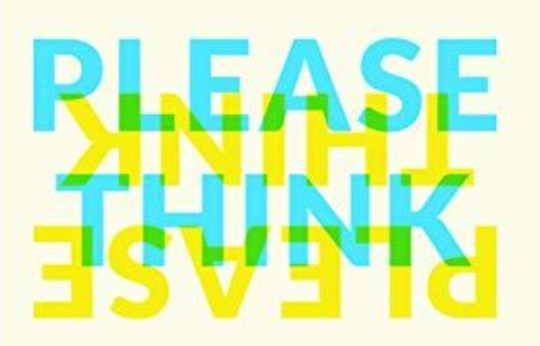
Yeah man. Please fucking think.
[Note: this post was written by a trans person and is inclusive of the experiences of trans folk, in India and abroad. This post is not grounds for you to segue into "gender critical" trans exclusionary bullshit.]
#mimirants#anti intellectualism#anti booktok#anti capitalism#radfems dni#terfs dni#books#text#texts#quotes#essays#adorno#tropes#india#feminism#intersectional feminism#secularism#critical thinking#media criticism#mimiwrites#my writing#theodor adorno#literary theory#neoliberal capitalism#long post //#tw sa mention#casteism //
290 notes
·
View notes
Text
As much as I love Disco Elysium, I think I was not prepared for Sacred and Terrible Air. Of course, I was expecting to know more about the world of Elysium as a whole, and Robert Kurvitz is a very good writer, but the thesis of the novel (and how it makes its points) flash-banged me.
Disco Elysium this is not, and it wasn’t supposed to be, but I think I can understand better now what the team at ZA/UM was getting at with this specific setting, and these specific narrative angles. Kinda messy, because it’s been a week since I finished it, but here are some things I’d like to highlight:
1. The pedophilia. I surely wasn’t expecting this to be such a central theme of the novel, but a lot of its main points revolve around it. The most interesting use of this, as a narrative device, is how the girlfriend of Jesper basically accuses him of being a pedophile because he cannot relate to the adults around him. He’s still obsessed with a girl he met when he was 13 years old, and fetishizes a scrunchie he stole from her bag two decades ago. Yeah, I guess Jesper, well into his thirties, is still in love with a 13 year old girl. His girlfriend is almost half his age, and they started dating when she was 15 years old and a lingerie model (!). Zigi mentions how pedophilia was a bougie disease, and well… That idea went right into my thought cabinet (I call it “Bougie Babies for Sale).
Still processing it.
Now, let’s go back to the rest of the main characters. With all this in mind, a pedophilic overtone covers their interest in these four missing girls, but Jasper is the only one who acts on it, sort of. Khan remains in a sort of arrested development (he still uses a shirt he had when he was 13), foregoing normal adult relationships, and Tereesz joins the police as an investigator with the idea of still finding them some day (essentially letting these eternally prepubescent girls define his entire existence), leading him to a very dark path. I wonder if the brutality they afford to the “actual” pedophiles in the story (Vidkun Hird and the Linoleum Salesman) comes from the realization that they are not that different?
2. Obviously, though, this fetishization of the Lund sisters is also a fetishization of the past. The novel states it in the first few pages; they disappeared twenty years ago, in a time that most conservative people remember as the “good old days”. Basically their version of the American Fifties. Now, being obsessed with the past is a running theme in both SaTA and DE, but the angle here is different.
I already said it: the past is not remembered, is fetishized with an almost sexual yearning by a lot of the male characters of the book. They want to be consumed by it (and lucky them! It will) and do nothing more than serve it. It reminds me of a poem by Yamil Nardil Sadek, which, translated to the best of my ability, goes like:
She awaits me
sitting on the bed,
wearing leather,
and armed to the teeth,
the Memory.
Yeah, that sums up Sacred and Terrible Air pretty well. Everyone is being consumed by the past, bite by bite, and enjoying it. Vidkun Hird, by the mythologized version of his tribe’s history; Sarjan Ambartsumjan, by a miniature ship model that requires constant, devoted thought or else it will disappear, the three main characters by the memory of that summer with the Lund girls. Even the Linoleum Salesman is being haunted and consumed, of sorts, by his sickness and dementia that only sometimes let him take a peek of the past. Beyond that, there are very few characters that do not spend time being followed by relentless ghosts. Literally, in the case of Zigi. Which brings me to…
3. The Pale. It was a really cool concept in Disco Elysium, and it’s an existential nightmare in Sacred and Terrible Air. It always was, really. But here it lets you take a look into it in a way that’s applicable in real life. The Pale is a metaphor for many things, but actually for a single one: A world where our current Capitalist reality facilitates both apathy and yearning for better days, often idealized in our collective pasts.
My favorite scene, one that was incredibly puzzling but so obvious in retrospect, is a beautiful speech by the ghost (?) of Ignus Nilsen to Zigi. I will just paste it here:
“I said terrible things, yes! I stood on a white horse, in a blizzard, and gave speeches. In the mountains, on the construction site… I swung my sword, with silver sunbeams on the hilt. And all around me fluttered white flags, crests of crowned horns made with silver thread, a pentagon between the prongs of the horns, the branches raised to heaven. Everyone who came here with me became happy, Zigi! Communism is powerful! Believe in Communism, it’s a burst of enthusiasm! I promise! It’s beautiful when you believe in a person, but without it…!”
“Without it, there is nothing.”
“Nothing. It was a blizzard, but it was bright, it was morning. Communism is white, it sparkles! Communism is the morning, it is a jubilation!”
The Pale begins to recede dangerously around the entroponaut.
The fucking Pale recedes with talk of Communism! At first it might appear a little heavy handed (yeah, Communism, by itself, could save the world). But then I got into how Communism could be a solution to the antipathy and chronic nostalgia that sustain Capitalism, and then it hit me. Nilsen, a literal ghost from the past, is talking about a future that could have been. That he wanted to accomplish. That people, probably, can still achieve. The Pale is not eternal, it can be pushed back. Because the Pale seems to subsist on the past, it abhors any talk of the future. A better future. That’s how we solve things, and for a central thesis, is not bad at all.
With that being said, and because I’m just rambling here while pretending I’m working, there are also some things that I just didn’t understand, but maybe it was because of the translation. The original novel is written in a very poetic style, and some of that is still here, but I still need to untangle…
1. The Man. It is said that the day the Lund girls disappeared, they were joined by a mysterious Man that nobody seemed to remember correctly. A character even suspects that she was remembering wrong. Now, the Pale erases people and memories retroactively, so maybe it had something to do with it, but… Who was that? Is there any theory about that Man, or I just missed something? Some scenes and narrations were tough to parse for me (my primary language is not English).
2. Was Malin Lund pregnant? That flash with the fetus was sudden and weird.
3. What was the significance of the three meat piroshkis? They mention that it was unusual that the girls bought them (and if you do the math, you can realize early on that they were not planning to get back home. That purchase didn’t leave them enough money for the bus fare back), but that’s it. Were they for the Man? Also, the narration mentions that Lund girls’ picnic basket contained “the kind of things girls like to eat”, so maybe they were planning to see the boys and bring them the kind of things boys eat? I’m overthinking that? The chapter actually titled “Three Meat Piroshkis” just left me even more confused.
4. I don’t understand how Khan’s pen works at all. The one he brought to the school reunion. That was the part I re-read the most. Anyway, even with that, I loved Sacred and Terrible Air. Definitely one of the most enthralling reads I had, with or without the background of Disco Elysium. I’d still like an official translation that could potentially solve the issues I had, but for now, a Top 10 Book for me.
Go for it now.
382 notes
·
View notes
Text
BoyBoy book club⭑.ᐟ
These books have either been mentioned or recommended by the boys, list made to the best of my memory, some notes added for context + little abstract. [(A.) = Aleksa's rec; (L.) = Lucas' rec; (Al.) = Alex's rec] Reply or reblog to add more to update the list thanks!
⊹ Caliban and the Witch: Women, the Body and Primitive Accumulation - Silvia Federici (A.) [Aleksa's commentary: Also 'Caliban and the Witch' by Silvia Federicci is brilliant. It's a great marxist-feminist retelling of the European witch-hunts, it's really really cool. It completely flipped my view of the birth of capitalism... She posits that capitalism is a reaction to a potential peasant revolution in Europe that never succeeded, and situates the witch-hunt as a tool of the capitalist class to break peasant social-ties and discipline women into their new role as reproducers of workers.] || Is a history of the body in the transition to capitalism. Moving from the peasant revolts of the late Middle Ages to the witch-hunts and the rise of mechanical philosophy, Federici investigates the capitalist rationalization of social reproduction. She shows how the battle against the rebel body and the conflict between body and mind are essential conditions for the development of labor power and self-ownership, two central principles of modern social organization.
⊹ The Age of Surveillance Capitalism - Shoshana Zuboff (A.) || This book looks at the development of digital companies like Google and Amazon, and suggests that their business models represent a new form of capitalist accumulation that she calls "surveillance capitalism". While industrial capitalism exploited and controlled nature with devastating consequences, surveillance capitalism exploits and controls human nature with a totalitarian order as the endpoint of the development.
⊹ Anti-Oedipus: Capitalism and Schizophrenia - Gilles Deleuze and Félix Guattari (L.) || In this book , Gilles Deleuze and Félix Guattari set forth the following theory: Western society's innate herd instinct has allowed the government, the media, and even the principles of economics to take advantage of each person's unwillingness to be cut off from the group. What's more, those who suffer from mental disorders may not be insane, but could be individuals in the purest sense, because they are by nature isolated from society.
⊹ Open Veins of Latin America - Eduardo Galeano (A.) (Intro to LATAM history, infuriating but good.) (Personal recommendation if you know nothing about LATAM.) || An analysis of the impact that European settlement, imperialism, and slavery have had in Latin America. In the book, Galeano analyzes the history of the Americas as a whole, from the time period of the European settlement of the New World to contemporary Latin America, describing the effects of European and later United States economic exploitation and political dominance over the region. Throughout the book, Galeano analyses notions of colonialism, imperialism, and the dependency theory.
⊹ The Origin of Capitalism - Ellen Wood (A.) || Book on history and political economy, specifically the history of capitalism, written from the perspective of political Marxism.
⊹ If We Burn - Vincent Bevins (L.) || The book concerns the wave of mass protests during the 2010s and examines the question of how the organization and tactics of such protests resulted in a "missing revolution," given that most of these movements appear to have failed in their goals, and even led to a "record of failures, setbacks, and cataclysms".
⊹ The Jakarta Method - Vincent Bevins (A.) [Aleksa’s recommendation for leftists friends] || It concerns U.S. government support for and complicity in anti-communist mass killings around the world and their aggregate consequences from the Cold War until the present era. The title is a reference to Indonesian mass killings of 1965–66, during which an estimated one million people were killed in an effort to destroy the political left and movements for government reform in the country.
⊹ The Anarchy: The Relentless Rise of the East India Company - William Dalrymple (L.) [Not read by the boys yet, but wanted to read.] || History book that recounts the rise of the East India Company in the second half of the 18th century, against the backdrop of a crumbling Mughal Empire and the rise of regional powers.
⊹ The Triumph of Evil: The Reality of the USA's Cold War Victory - Austin Murphy (A.) || Contrary to the USA false propaganda, this book documents the fact that the USA triumph in the Cold War has increased economic suffering and wars, which are shown to be endemic to the New World Order under USA capitalist domination.
⊹ Technofeudalism: What Killed Capitalism - Yanis Varoufakis (L.) || Big tech has replaced capitalism’s twin pillars—markets and profit—with its platforms and rents. With every click and scroll, we labor like serfs to increase its power. Welcome to technofeudalism . . .
⊹ The History of the Russian Revolution - Leon Trotsky (A.) [Aleksa's commentary: This might be misconstrued since I'm not a massive fan of Trotsky... but... his book "History of the russian revolution" is amazing. It's so unique to have such a detailed history book compiled by someone who was an active participant in the events, and he's surprisingly hilarious. Makes some great jokes in there and really captures the revolutionary spirit of the time.] || The History of the Russian Revolution offers an unparalleled account of one of the most pivotal and hotly debated events in world history. This book presents, from the perspective of one of its central actors, the profound liberating character of the early Russian Revolution.
⊹ Rise of The Red Engineers - Joel Andreas (A.) [Aleksa's commentary: It's a sick history book, focusing on a single university in China following it's history from imperial china, through the revolution and to the modern day. It documents sincere efforts to revolutionize the education system, but does it from a very detailed, on-the-ground view of how these cataclysmic changes effect individual students and teachers at this institution.] || In a fascinating account, author Joel Andreas chronicles how two mutually hostile groups—the poorly educated peasant revolutionaries who seized power in 1949 and China's old educated elite—coalesced to form a new dominant class.
⊹ Adults in the Room: My Battle with the European and American Deep Establishment - Yanis Varoufakis (A.) [Aleksa's commentary: The book I mentioned earlier - "adults in the room" - is amazing. There's a great description of Greece's role in the European economy [as an archetype for other, small European countries] and the Union's successful attempts to discipline smaller countries to keep their monetary policy in line with the interest of central European bankers. I'd definitely reccommend it!] || What happens when you take on the establishment? In Adults in the Room, the renowned economist and former finance minister of Greece Yanis Varoufakis gives the full, blistering account of his momentous clash with the mightiest economic and political forces on earth.
Edit: Links added when possible! If they stop working let me know or if you have a link for the ones missing.
#IDK if anyone else is interested in this but in case anyone finds it useful <3#boy boy#aleksa vulović#alex apollonov#ididathing#ngl most of this r aleksa/lucas recs.... idk if any of them are alex sorry i forgot?
121 notes
·
View notes
Text
I think instead of outright rejecting all instances of AI, we instead need to critically think about What exactly we are gaining from using it and what experience we may be losing as a consequence
Use AI to do a bunch of painstakingly tedious scientific work for medical research? Valid use (ex. Protein folding software)
Use AI to summarize a the chapter of a book? Well I mean, you could. But what if you could’ve learned a new word? What if taking the time to immerse yourself helped you relax? What if reading the exact sentences as they were written by the author made you more emotionally invested?
and of course we’re pushed to strive for pure results because the US lives in a capitalist pressure cooker society obsessed with constant productivity and we are given less and less time to do things outside of work.
By using ai you might not even fathom what experiences are being robbed from you. Because 99% of the time, the process is the most valuable part of learning, never the final product.
I feel like this argument can be applied to all technology at this point, which is when it sort of becomes a slippery slope. But it’s undeniable that smartphones and social media have already consumed our social lives and made irl interaction less meaningful and less frequent. The best social interactions I’ve had were during a power outage, or other instances when I was ripped away from electronics. I’m not ready for AI to take away our sight of everything else. It terrifies me. But deep down I want to hope. I know that no matter how bad it might get in the future, we will rediscover ourselves time and time again. Humans have a certain tendency to break free
#Txt#Anyways its late & I didn’t do an assignment & I’m not going to get enough sleep <3#Ai critical
93 notes
·
View notes
Text
For some reason my mind has been overthinking the League of Assassins and Ra’s.
I feel like many portray Ra’s as a violent man potentially driven insane by the Pit who rules his subordinates with an iron fist. The Pit is used to many times as a plot device to create a purely evil villain to pit heroes against them, which is a cheap way to write plot and themes. Also historically, Ra’s been a very grey character, who has a very noble goal, did good things while also committing crimes.
To me, it doesn’t make sense for Ra’s to be a leader that rules by fear alone because:
1. He has seen countless kingdoms and empire fall, so he knows better than anyone that loyalty earns through ally ship and mutual aid works best, that giving them everything they need and basically buying them out of difficult situations (homelessness, war, famine etc.) would cement a positive association between him and them. Which leads me to:
2. Ra’s goal is to make the earth a better place, to bring back its glory. One obstacle is the capitalist imperialist and exploitative society that humanity came up with. He wants to dismantle harmful structures, which would be hypocritical if he acted the same ways as companies and tyrants operate by stepping on their people. So he build comfortable lives for the people working with, making sure he can give what other people or organisations can’t.
(And if he often has to prey on vulnerable and easily manipulated recruits, it is the price worth paying. And many have been happy to see improvement in their quality of live after joining.)
All this makes me think Ra’s would not abuse Damian like I see so often: punishing harshly for any mistakes, using physical violence “as a teaching moment” but is actually mindless torture or treating him like a dog
Instead, he’d be the kind of parent putting to put too many expectations, to wish for perfection, while positivity reinforcing the behaviour he wants out of Damian: Damian choosing training over leisure, him putting more hours than he should into studying and fighting, him reaching goals faster than anyone, him seeking to be mature and respected.
I’d say Ra’s would subtly pushing Damian into the path he wants by saying stuff like “the world’s time is not guaranteed, you cannot afford to lose precious minutes chasing butterflies. Go finish that ancient book” or “you mind can be distracted during battle, you need more training and meditation to focus.” “Good initiative to start learning that language, I think expect nothing less.” It would be counterproductive to beat Damian up to the point he’s bed ridden and losing days recovering.
And all this would make it difficult for Damian to choose between Gotham or Nanda Parbat: his childhood is no childhood a kid should have but at the same time, he still got praised by his grandfather, he still remembers all the life lessons, he still kept the deep desire to change to world for the better.
It still feels like family
75 notes
·
View notes
Text
Merry X-Men Holiday Special Highlights
Happy holidays, everyone! It's been about a year since I started posting about the X-Men on Tumblr and if it wasn't for all the lovely folks who engage and discuss it wouldn't be so enriching. I'm super anti-capitalist and anti cultural Christianity so it's less 'Happy Christmas' and more 'I wish y'all the best.' ❤️💚
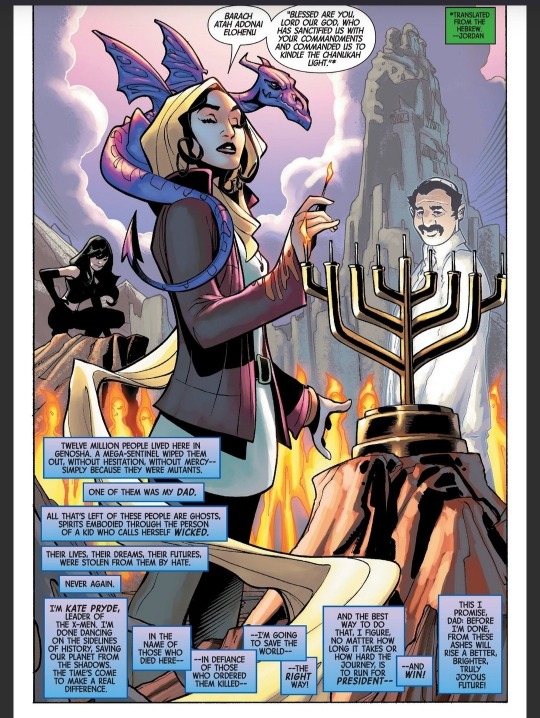
I wonder if Lockheed speaks Hebrew
Here's Kitty Pryde celebrating Chanukah in Genosha and remembering her father. Leading the special with an explicitly Jewish character observing a Jewish holiday is great, but the notion of saving the world by becoming president of the USA is a dubious one. The USA is an imperialist entity built on deep seated systemic inequality and worse. Even the most progressive of presidents is beholden to that. It doesn't mean we shouldn't try, but Kitty is kidding herself about 'saving the world the right way.'
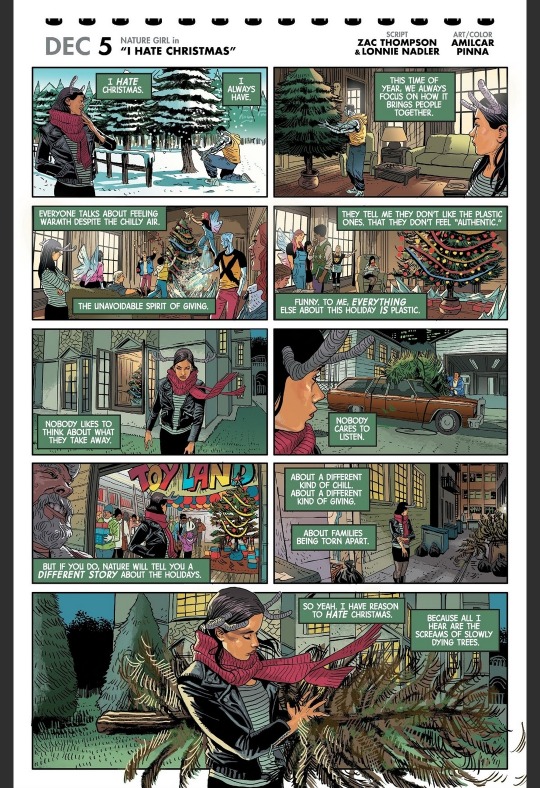
Nature Girl hates Christmas, and it's hard to argue with her reasons. The parts about warmth are weird to me because I live in Australia where Christmas is always hot AF. One of the few days I hope for rain, tbh.
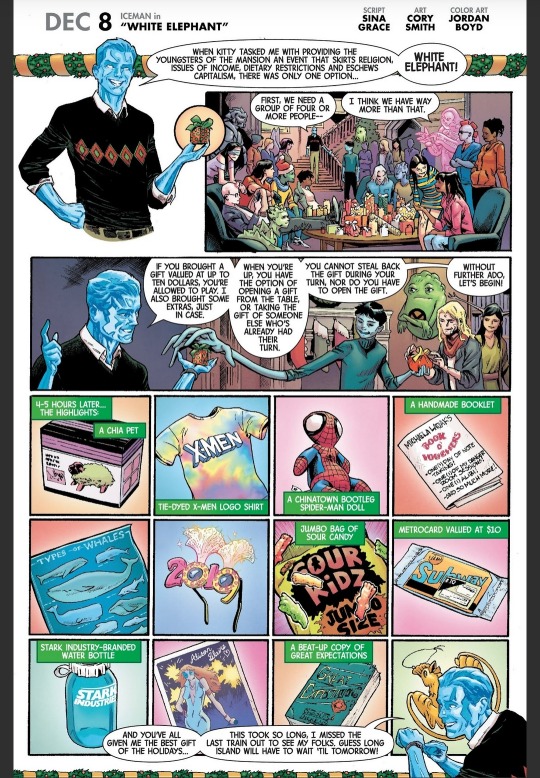
I'm not sure if Bobby quite understood what 'eschewing capitalism' means but this looks pretty fun. That tie dye X-Men tee slaps and I want one. I wonder what Kubark thinks of this human holiday.
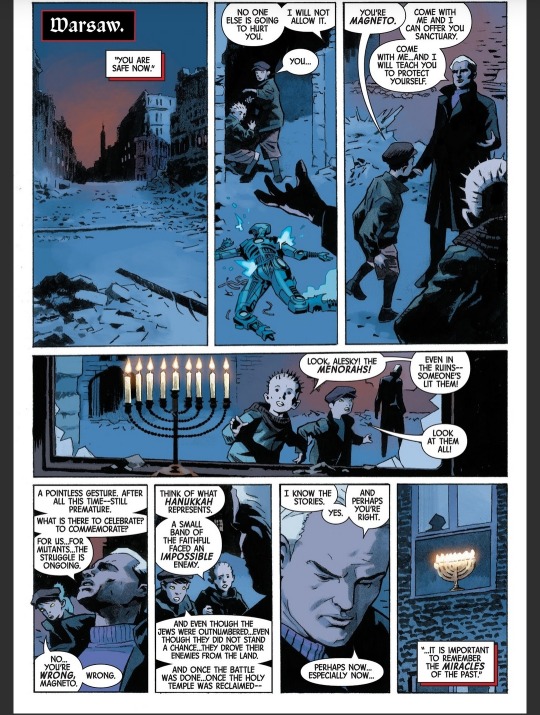
This story with Magneto coming around on the pointlessness of lighting menorahs does the rounds every now and then, though not as much as I'd expect. The kids are particularly plucky and eloquent, and the one who emphatically tells Magneto he's wrong is a legend. I'm fond of any story where Magneto rethinks his beliefs, and this is a nice one.
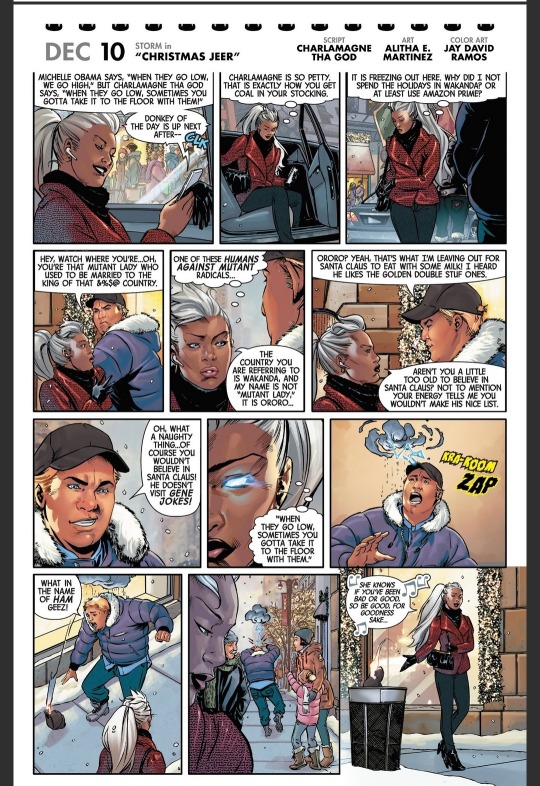
It took me a while to notice that this is written by Charlamagne tha God, possibly because it's kinda funny to imagine Ororo knowing who that is. Idk why, I've just never seen any stories indicating that she's into Hip Hop culture. I like that it's a rejection of turning the other cheek where bigoted assholes are concerned. You can't reach some people, and there's no obligation to exhaust yourself trying. Fuck em. The Michelle Obama mention is a bit on the nose.
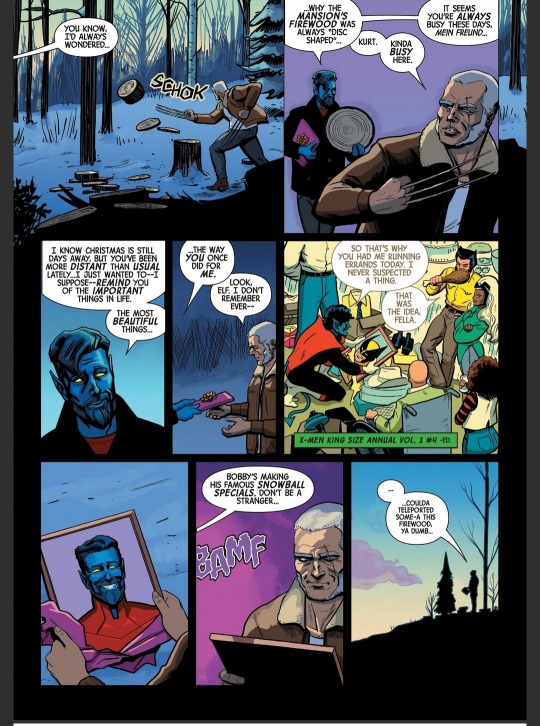
Old man Logan is cutting firewood and being gruff, as he does. Kurt gives him a picture of himself, which is a baller move. I was under the impression that this Logan was an alternate reality Logan, and doesn't have a particularly close relationship with these X-Men. Nothing about Logans makes sense, sometimes you just have to accept it as cute and cool.
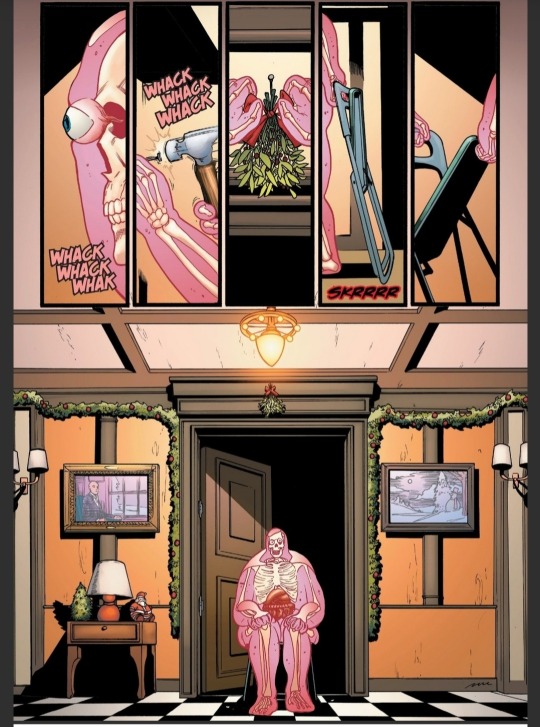
Glob does stuff! Is that meant to be mistletoe? We don't have it down here. He nails up some plant matter and then chills by himself. Little bit depressing, but I can't talk.
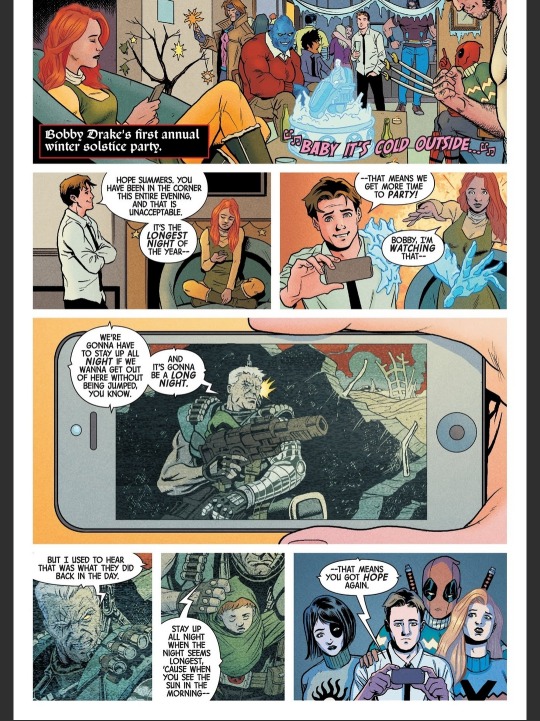
Bobby Drake has a party! Interestingly neither Jewish nor Christian, but a pagan holiday that's become a bit more popular (like Christmas and Easter.) Hope is watching Cable do... something, in a recorded message from when she was the universe's most unpopular baby.
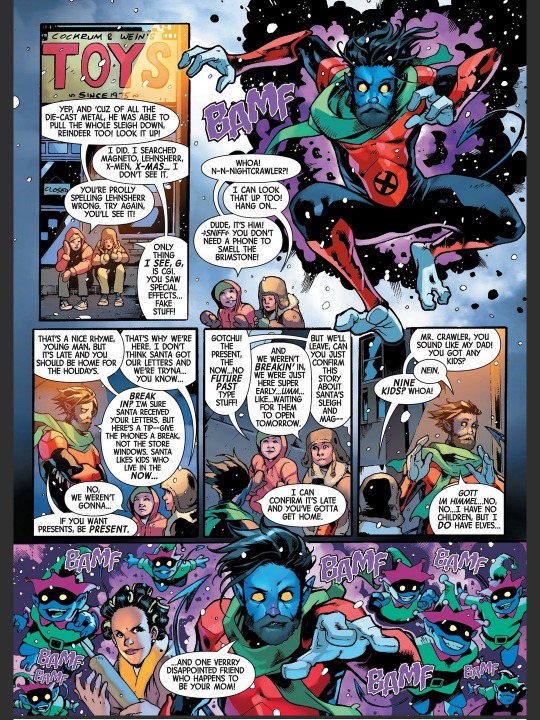
Some kids are sharing the rumour that Magneto merked Santa, which is hilarious. It's obviously untrue, not least because Santa is Mags' mutant brother. Kurt lectures them.
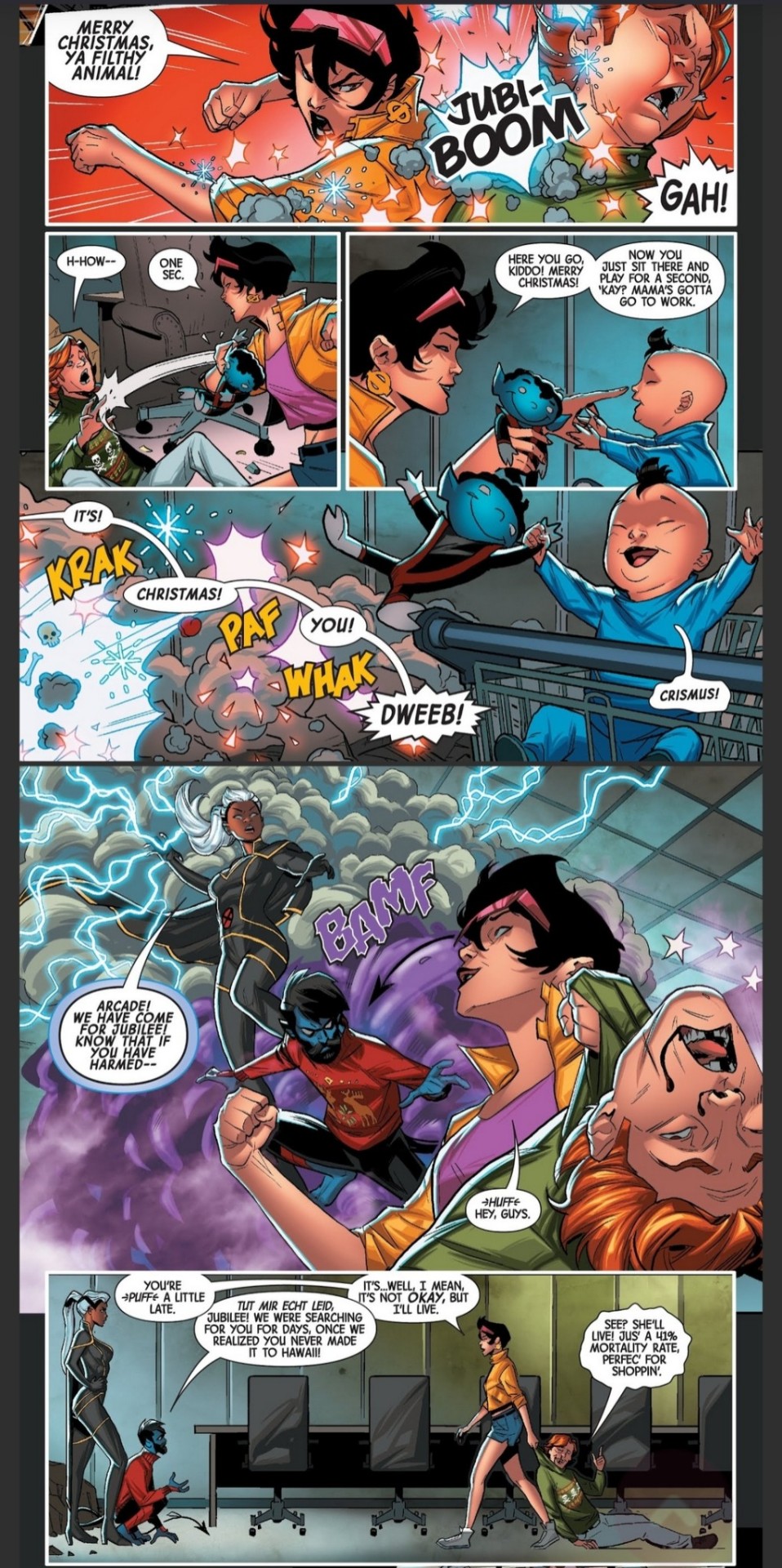
Jubilee beats up Arcade (yay!) and quotes Home Alone, rescuing Shogo (who's spending this Christmas as a dragon in Otherworld.) I really don't like Arcade, though he has done two excellent things. Torturing Sinister and creating the Proletarian - worker's hero of the Soviet Union.
Nightcrawler and Storm show up and Christmas is really just a backdrop for a light anti-capitalist tale. Cool! I'd expect Cyclops to be in this book, but no. It's Chuck-less as well.
#x comics#x men#holidays#magneto#wolverine#nightcrawler#storm#jubilee#shogo#iceman#hope summers#domino#cable#glob herman#arcade#charlamagne tha god#kitty pryde#nature girl#genosha#marvel#comics#christmas#chanukah#hannukah#charles xavier#cyclops#beast#the Proletarian
49 notes
·
View notes
Note
I did not get into Game of thrones when it first started airing. In fact, I waited until it was long past it's heyday (around s6 or 7) to check it out because the marketing and the conversation surrounding it misled me into thinking it was nothing more than "grimdark" bullshit. As one famous YouTuber sarcastically called it "hot fantasy that fucks." So, I avoided Martin's work for literal years due to the impression that I got from online reactors and show-only casuals who did as you and a few others have described as his work being fundamentally misinterpreted.
Fortunately, I overcame my hang-ups, purchased the books (even the supplementary material) and fell down an entire rabbit hole of ASOIAF which led me to recognizing that this world he spent decades creating is far more complex than what had been portrayed onscreen. Regardless of the possibility of the books remaining unfinished (which I am fine with, personally), what George has created is a genuine work of art that I imagine took a tremendous amount of time and energy. So, for so many people online to behave like children and throw tantrums because they feel entitled to him (ew) instead of ushering forth more reasonable conversations and legitimate debates about the nature of his situation frankly makes me look at this fandom with a heavy dose of skepticism.
It is truly baffling to hear even professional critics and see articles describing George as being "ungrateful" or "unprofessional" when it has been well-documented just how often authors get locked out of the adaptation process and left to the wayside as consultants. Look at what happened to Rick Riordan and Christopher Paolini! George R.R. Martin is not the only author to have qualms with how a multimillion dollar studio has mishandled his creative work, and to act like he should remain silent just because he's amassed a certain degree of wealth is quite frankly, ridiculous. He shouldn't have to settle down, be grateful, and stay quiet because the greedy corporate executives and their media drones will get offended by actual criticism that could alter the perception of the adaption being revealed as mediocre for having departed from the source material.
TLDR: authors should be allowed to speak up about their art being sacrificed for commercialization.
Thank you so much for this message, anon! This needs to be talked about more, because I don't think a lot of commentators truly understand the vulgar, late-capitalistic sheen that seems to set in and slowly poison any ASOIAF adaptation. It honestly baffles me how quick some members of this fandom are to rush to the defense of, what is essentially (let's not be kidding ourselves here), a cashgrab by a giant corporation to the detriment of the actual artist and the actual creative foundation behind it.
Why else would "MAX" (if that is even their name) make another (or several other) ASOIAF adaptations? Not to stay true to any philosophical aesthetic vision, as it has become more than apparent with Season 2, but to increase shareholder profits by appealing to the lowest common denominator. Even the basic premise has been shifted in order to address popular trends and satisfy the mindless consumer that doesn't want to engage with anything deeper than their favourite tropes, prettily packaged:
from a story about a doomed ouroborous family superimposed on the pitfalls of feudalism, with villainy and heroism to be found on both sides, it has been simplified and reduced to a narrative that exalts white feminism and disqualifies anyone who opposes its girlboss protagonist. This is Sheryl Sandberg's version of Fire and Blood.
Truly, I think Sara Hess did (unintentionally) outline it the best: "civilians don't matter in Game of Thrones". They don't matter in Game of Thrones, but they matter in A Song of Ice and Fire. The entire heart of the series is contained in Septon Maribald's speech. The writers "kind of", must have forgotten, though.
#she sure showed her entire ass with that comment#that and (to a lesser extent) 'oh i read the books a long time ago'. girl. we can tell.#(and don't think i'm letting ryan condal off the hook - he is the main shill in this equation)#ask#anon#grrm#house of the dragon#hotd s2#also i'm not in any way able to speak on grrm's behalf here because i don't know the man's prior financial situation#but a lot of writers would probably sell the rights to their books if asked#because it would finally mean they would have financial stability#in a field that pays notoriously very little. it's very difficult to support yourself as a professional writer. you'd have to sell a ton#and there's no saying when your popularity will suddenly declin and the cheques stop coming. what if you never have another good idea again#so do not be so quick to judge writers for 'selling out' or whatever the hell. they're trying to make a living too
78 notes
·
View notes
Text
CLAMP's legacy as originally starting from doujinshi circles is really fascinating and makes a lot of sense when you understand that a lot of their manga are just straight up loose adaptations or spiritual reinterpretations of some of the most iconic pieces of 20th century japanese fiction, especially literature.
In many ways a lot of their storytelling is best described as "derivative" but I don't really like using that word because it has such a negative connotation. I think CLAMP's genius is actually their ability to iterate on the themes and ideas and character types and other inspirations that they derive from, especially in their ability to translate those elements to a visual/aesthetic format and to add themes of queerness into those stories or highlight the already present elements of queerness.
Like Tokyo Babylon is inspired by Teito Monogatari (and also Peacock King but that in of itself is a subject for a whole other post). And it's not just limited to the quick one-off comedic reference to Yasunori Katō that we see in the beginning of the manga. The title itself is a reference to the first manga adaptation of the Teito Monogatari. And that title choice for the adaptation was itself probably a combination of a deliberate reference to the Book of Revelation which was culturally relevant in Japan at the time for reasons I'll explain in a little bit, as well as the fact that the author of Teito Monogatari based Katō in part on Aleister Crowley. But Teito Monogatari and Tokyo Babylon are fundamentally stories about the exact same subject matter, that is the City of Tokyo itself.
X aka X/1999 is pretty self evidently a loose adaptation of the Digital Devil Story novels, the ones that would go on to be adapted loosely into the Megami Tensei video games. An apocalyptic battle for the fate of the entire world fought in Tokyo between two ideologically opposed groups of super powered beings, one of which is literally called The 7 Angels. There is a magic sword associated with the death of a female loved one, there are references to a whole bunch of religious and occult concepts from both the east and west, and one of the key locations for the plot is an elite private high school. X and DDS/ Megaten are both quintessential examples of media born from the Japanese Occult Boom. Bad Japanese translations of the prophecies of Nostradamus in the '70s that inspired the Book would become mixed with the social and economic chaos that was the Japanese asset price bubble and other late stage capitalist nonsense and then the financial collapse in the '90s is why you have in both Tokyo Babylon (and by extension the manga adaptation of Teito Monogatari) and X this weird obsession for the Book of Revelation in a ostensibly non-Christian cultural zeitgeist. Tokyo was both "Babylon" as in Rome or any sort of other hypothetical city / civilization that represented decadence and degeneration, and it was Tel Megiddo in the sense that it was the place where the end of days and the battle heralding the Apocalypse would commence.
And then Gate 7 is literally just one of dozens upon dozens of fanfic/ rip-off / adaptations of / works inspired by Makai Tensho which came out in the '60s and sort of is kind of the cultural grandfather of novels like Digital Devil Story, Teito Monogatari and the Onmyoji series. It's the modern source of basically every piece of Japanese pop culture that treats the notable historic figures of the Warring States Era as more than just badass warriors but literal demigods, sorcerers and super powered beings. Mirage of Blaze(which also has some pretty clear inspirations from Tokyo Babylon and it sort of exists in a trifecta with TB and Yami no Matsuei in their relation to the Onmyoji novels by Baku Yumemakura but again, that is the subject for another post), Samurai Warriors and Sengoku Basara, pretty much all of the Fate series but especially the original Stay Night and especially especially Redline/ GudaGuda and Samurai Remnant, and a whole bunch of fighting games and Ninja OVA'S are all examples of Makai Tensho's influence.
#CLAMP#clamp#tokyo babylon#x manga#x/1999#gate 7#teito monogatari#doomed megalopolis#digital devil story#shin megami tensei#megaten#makai tensho#fate series#fate stay night#fate samurai remnant#sengoku basara#samurai warriors#japanese occult boom#media analysis#peacock king#onmyoji#bl manga#clamp manga#manga#sci fi novel#yami no matsuei#honoo no mirage#mirage of blaze
37 notes
·
View notes
Note
The rapresentation of abusers in helluva boss is something that particularly frustrates me, Stella in particular, it seems to be done just to victimaze certain characters not to show the complex dynamics of those relationships. It seems to me the writers aren't mature enough to handle these topics properly.
Abuse and Vivienne Medrano
Christmas 1962, a man renowned the western world over for his revolutionary approach to animation sat in a withering melancholy as he watched what could only be called a cinematic masterpiece based on a novel classic. Walt Disney, now in the twilight years of his life, saw the walls closing in and his legacy coming to a close. This man, who pioneered the animated feature film, saw his greatest accomplishment as his greatest obstacle. The man responsible for the tales brought to life of Cinderella, Snow White, Pinocchio, and Dumbo felt trapped in his achievement. “I wish,” Walt lamented, “I could make a picture like that.”
To Kill a Mockingbird was a piece that challenged its audience. The discussion of a white man defending a black man in southern America, years before the civil rights movement. The movement that, at the time the movie hit cinemas, was in its infancy. Released during the height of the historically revisionist counter movement taking place to combat the rising push of African Americans towards their human rights. The last film Walt Disney ever saw the production of before his death in 1966 was The Jungle Book, a movie that was the epitome of “Safe” and a message that upheld the status quo of segregation.
It wasn’t until 1972 that the media of animation became raucously adult with those political and challenging concepts Disney felt were unattainable. Fritz the Cat was an X-rated animated film composed of vignettes that were unapologetically perverse, violent, and aggressively political. Critical of politicians and the police with a sympathetic if exploitative lens towards the LGBT and racial minority communities Brooklyn-based director Ralph Bakshi grew up around. Bakshi proved that animation was not strictly a child-friendly media and that adult animation could be financially and critically successful.
(For more on Ralph Bakshi's career and animation history)
If one has ever had the opportunity to listen to a Brad Bird (director of Ratatouille and The Incredibles) interview, it is clear to see that the success of Bakshi was generally quite limited. That animation is considered a genre and not a medium of art has resulted in animated films being knee-capped in the box office. There is far more potential to animation, highlighted by Howard Ashton in his collaboration with Disney studios during the Renaissance. Responsible for resurrecting the feature-length animated movie through The Little Mermaid and credited for the monumental success of Best Picture Award winner Beauty and the Beast, Ashton once said that the potential animation was ideal for musical theatre. The limitless possibilities given the medium gave the possibility of introducing Broadway to the common folk who didn’t live in New York and otherwise couldn’t afford the theater. He was quoted saying that live action musical films were “an exercise in stupidity,” highlighting the freedom that comes with a blank page.
However, the success of animation, and media in general, comes down to the message the media wishes to send. The reason the Disney Renaissance films have enjoyed their position as cornerstones of pop culture and creativity was because it did introduce the artform of musical theater into homes and made them readily accessible to everyone with an even heightened sense of fantasy that revitalized Walt’s ethos of making films for the child in everyone.
With Bakshi, it was the loud and violently political message of a revolution taking place. This continues in adult animation with the Simpsons, a series critical of hyper-capitalist America and the fallout of Reagan’s economic disaster that the effects of which are still being felt today and a satire of toxic masculinity and abusive family dynamics.
So, ultimately, the value of a piece of media is a cross between its social artistic influence and the message the creators are intending to make. While Medrano’s influence on the field of indie animation is often mischaracterized as a “pioneer”, the fact is that indie animation and pilots have existed and been funded before Spindlehorse existed. It is simply that Medrano has had the spotlight handed to her for the myth surrounding the production and subsequent success of his indie projects. Artistically, her influence can be summarized as a double-edged sword. For some, she is the motivation for inspiring artists to connect with the community to one day, hopefully, create their own work. On the other hand, she is the cautionary tale of why investing in an indie project is a financial risk for an audience member and a risk to the community as a whole that poses a real danger of making the indie sphere financially cannibalistic, as her public persona is off-putting to “normies” and her show is simply not good.
Much like Disney, the man in 1962, and Disney the company circa 2023, the revolution of animating "because you can" loses its luster very quickly. Without something profound to say, an entire company, regardless of its social influence, can fade into irrelevance despite still being "successful". The story of Disney is a cautionary tale for Indie animation as a whole and Spindlehorse in specific.
And that is the other axis on this chart. Her narrative lacks a message worth telling, and that’s very much due to her not having anything worthwhile to say.
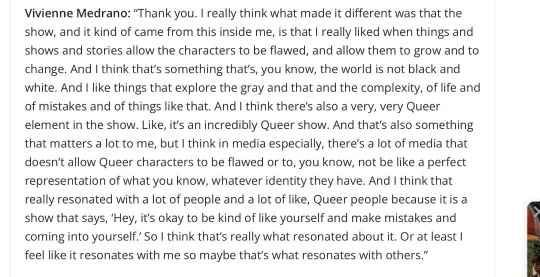
“I really liked when things and shows and stories allow the characters to be flawed, and allow them to grow and to change. And I think that’s something that’s, you know, the world is not black and white. And I like things that explore the gray and that and the complexity, of life and mistakes and of things like that.” - Vivienne Medrano
It is not for want of mockery that I carefully transcribe Medrano’s words in her interview. To read the words aloud tells the story just as clearly as I have set out to do here. This is someone who is highly inspired by better media, who has ideas and a belief that she has something to say. But that is where the belief ends. There is no conclusion to that thought any more than there is one in the unfocused and run-on sentences she rambles along throughout the interview. She talks of “Things” without clarity, because she herself is a fundamentally incurious individual who has never once spent the time critically analyzing herself, let alone the work of others to better grasp what about it resonated with her. She merely consumes art insatiably and without any substance. Like a diet of fruit, it has a superficial veneer of positive value. Fruit would be considered healthy as it is “natural”. However, it is the nutritional equivalent of candy, lacking vital components that are necessary to sustain basic life, it is pure sugar. Her work, similarly, lacks any value of depth that would qualify as meaning.
Which comes back to what the message is in her work.
When it comes to others in the field of indie animation, Medrano does not have many friends. In response to the Lackadaisy situation, creator Tracy explained why she returned Medrano’s donation. For one, the donation was not Medrano’s money, but money she crowd sourced from her employees. While the $5k for the producer spot of the fundraiser would have not been a dent in her personal wallet, Medrano is so uninterested in supporting fellow creators while presenting an impression of camaraderie that she instead took money from the people she is in charge of the paychecks for to get her name in the credits of another creator’s work. In regards to why Medrano was declined her support, it was due to numerous individuals who had such an awful experience working for Medrano that they did not want her involvement associated with the project to any extent. When the money was returned, she made the situation extremely public and encouraged harassment by liking tweets attacking Tracy and the Iron Circus team.
A well-known member of Medrano’s crew, Hunter B, was leaked speaking crassly of other animation projects that were still in the process of production, met with support from other members in the discord. One of these creators being Ashley Nicoles from Far-Fetched. A former friend and creative partner on the Hazbin Pilot whose podcast streams featuring Edward Bosco and Michael Kovach single-handedly maintained interest in the show until the winter of 2021, free of charge. Ashley once spoke of how Medrano would speak disparagingly of an employee to her, saying that this individual was “Too unstable to work with”. Which, regardless of whether or not that is Medrano’s honest opinion, counts as defamation by an employer. It is the exact reason why most previous employers will not give a negative, detailed review of a former employee, maintaining instead to verify facts of the employment. If Erin Frost was more experienced and less involved in social media exposed culture, they could have easily sued Medrano and Spindlehorse for damaging their reputation in their field of employment.
Which circles back to Medrano’s self-assigned message of her show:
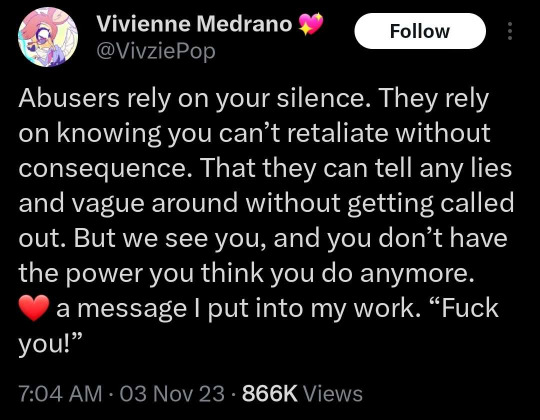
“Abusers rely on your silence. They rely on knowing you can’t retaliate without consequence. That they can tell any lies and vague around without getting called out. But we see you, and you don’t have the power you think you do anymore. A message I put into my work. “Fuck you!” - Vivienne Medrano
Medrano, who has vague and sub tweeted individuals like Lackadaisy Tracy, The Diregentlemen, Michael Kovach, and Ashley Nicoles. Medrano who has instigated and incited harassment campaigns knowing that no one can call her out without severe and relentless backlash from her cultish fanbase that she personally encourages through positive reinforcement of liking the tweets of fans. Medrano who relies on the silence of other creators in the field due to the fear of her ire collapsing their projects before they even have a chance to begin.
Vivienne Medrano with an extensive abusive history that continues to this day, has something to say about abuse.
What Medrano has to say about abuse comes from someone who has the position of superiority in all of her relationships, but feels like she’s the outcast and bullied loser. Her self insert that is repeatedly expressed in every character at one point or another is how easily they abuse those around them just because they can, but that the narrative justifies their “acting out” because they are sad. According to the National Coalition Against Domestic Violence, “An abuser externalizes the causes of their behavior. They blame their violence on circumstances.”
Indeed, the lists of abusive characteristics and traits, according to the National Coalition Against Domestic Violence, overwhelmingly encompasses the characteristics shown by characters like Loona, Blitz and Stolas that Medrano repeatedly has attempted to rationalize, justify and minimize. Which, “An abuser often denies the existence or minimizes the seriousness of the violence [including emotional and mental abuse] and its effect on the victim and other family members.”
It is not surprising, then, that the conversation of abuse in Helluva Boss is often infuriating. The narrative underplays the harm done by characters we are supposed to see as “good”. Not allowing for them to grow or change, but ignoring and minimizing the behavior, justifying it through circumstances and perpetuating the false belief that victims are not, themselves, abusers.
One of the first blog post rants I ever made about mental health and abuse was the affirmation that not all victims of abuse are survivors. I wholly stand by that. Victims of abuse perpetuate abuse. A victim and an abuser are one in the same, whereas a survivor is someone who has actually done the difficult work of being self-critical. And the one thing we all are very aware of is how much Vivienne Medrano rejects criticism.
#helluva boss critical#helluva boss criticism#helluva boss critique#vivienne medrano#vivziepop#vivziepop critical#spindlehorse critical#spindlehorse criticism#vivziepop criticism#helluva boss#perpetuating abuse#narcissistic abuse#abuse breeds abuse#essay writing
249 notes
·
View notes
Text
The DnD Lore Problem - Accessibility and Characters (and how BG3 might not help)
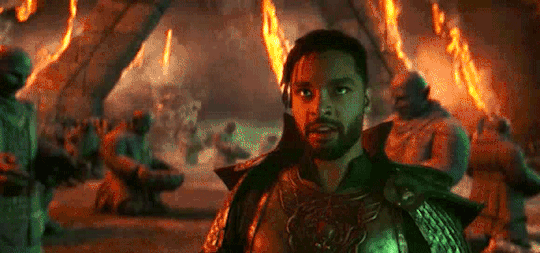
You know what? I am gonna talk about DnD Lore and the accessibility of that lore. I talked about this exessively before. But to summarize that long blog very shortly:
Wizards of the Coasts currently makes the mistake of putting basically most DnD Lore behind a paywall, rather than offering official ressources. This leads to a lot of tables actually playing with their original worlds, rather than Toril/Faerûn, which in turn also means, that they are not spending money on official products. While my anti-capitalist ass things that the lore should be accessible just so that people can enjoy it, I also think that this inaccessibility actually costs WotC A LOT OF MONEY.
Today I want to talk about another aspect of this inaccessibility, that is kinda linked to some of the stuff I talked about before, but also is linked to the things WotC is currently not doing in terms of both Honor Among Thieves and Baldur's Gate 3. A thing, that also might not quite work with BG3, though.
See, the core problem of this inaccessibility is, that a) there is no official place where you can just get base information about the world and the timeline, b) this world has grown organically for about half a century, which lead to clutter, but also to the fact that things are at times showing their age.
I might actually make a post on the gods and religion in the world at some other point - but for now let me talk about something else: Extended universes and access points.
The Problem with Extended Universes
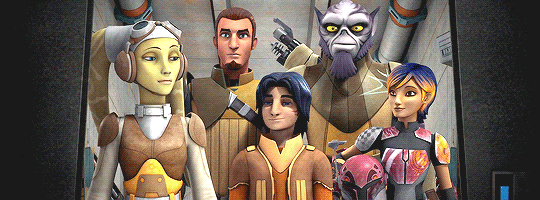
Okay, let's talk about how a lot of the big franchises for the longest time have told their meta stories - including DnD - and how it kinda struggles to find its audience. The extended universe.
I am frankly not entirely sure what franchise has started this. I am assuming it was Star Trek? But that is just a guess. But at some point in the 60s oder 70s someone had the idea that: "Hey, we could totally give the fans more to chew on by making official tie-in comics and novels!"
And that was how it worked for very long. Like a lot of the big franchises had at times around 10 novels and comics (if not more) releasing per year that would just explore other parts of the universe and allow the very engaged fans to... well, learn more about the world. Now, I am not going to talk about all the drama connected to the Star Wars stuff, but if you know, you know.
DnD did this too. (As did a lot of the big TTRPG systems, like Shadowrun and WoD as well.) Having a lot of tie in stuff - in the case of DnD mostly novels - that told more stories on the world and also established like some big player characters within the world. Elminster Aumar is probably one of the best examples here.
Those established some characters that play a big role within the world and also told just more stories of those big world changing events. In the recent DnD history that would be stuff like the Time of Troubles, the Spellplague and the Second Sundering.
Now, here we have one big issue. And one issue where I am not entirely certain where it arose from. But the fact is: In recent years, people invest way less into those kind of books. This is just a fact.
It is the reason why those big universes went from publishing like ten novels a year to often not more than three. We saw that in the failure of the extended Universe Disney tried to pull off for Pirates of the Caribbean (though I will still maintain that another big problem was that they barely marketed that at all - hi, everyone, who did not know there were extended universe novels for PotC). We also saw that with League of Legends, who really, really tried to tell a lot more stories with short stories and then also some novels set in Runeterra, before finally giving up, because most people didn't care.
In terms of Dungeons & Dragons I can totally see that a lot of people will also say: "I do not care what some other people's characters do within the world." Buuuuuut...
Stories actually can help you understand the world. Which brings me to...
The Elminster Problem
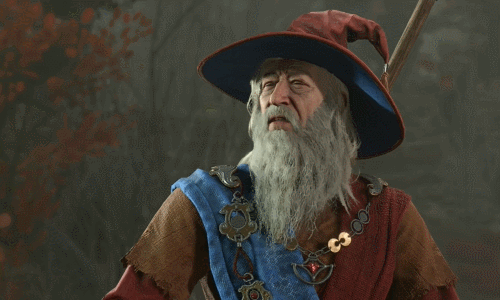
Okay, I do not know how to put this, but... If you look at the novels coming out for DnD literally half of them focus on either Elminster Aumar or Drizzt Do'Urden. Characters that have pretty much been around since the very beginning and. Look, I don't know how to put it but... It shows.
I am currently reading some of the newer novels and the fact is, that they do not really feel like fantasy books from the 2010s and 2020s. Because Elminster and Drizzt are very clearly characters originating in a very different time when stories were told very differently.
I mean, just look at Elminster. He is a wanna-be Gandalf character. He is from the early, early days of fantasy and... Look, I personally just really am unable to identify with a character like this.
And while Drizzt is a bit better as a character, but even he... How to put this delicately? They are both very much characters written by white cishet men for white cishet men. There, I said it.
I am noticing this a lot with reading Salvatore's books currently. Like, female characters are not overly sexualized, which is a plus. But they also very much exist most of the time in service to a man or at least in relation to a man. There is not a lot of female characters running around that have their own agency.
Which kinda leads to another thing. I actually saw this one brought up by one of those very cliché nerdy Youtube channels talking on DnD, who recognized the problem as well: There are basically two large groups of DnD players who barely intersect. One is the cliché nerds, the other is a largely queer and largely diverse group. And the youtube guy, who was very in the white cishet nerd group, suspected that actually the later group makes up more of the player base by now.
Buuuut... that is also the group who really do not get catered to by the canon lore so far. That was until 2023 with DnD:HAT and BG3 - both catering actually a lot to those groups.
Honor Among Thieves and the undermarketed books
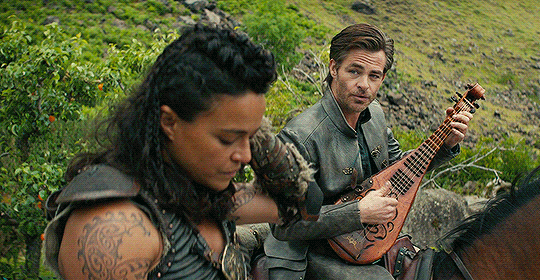
Okay, here is the thing: Honor Among Thieves had two novelizations (one for young readers, one for older readers) and two tie-in novels. One featuring Edgin, Holga, Forge and Simon before the stuff with Sofina went down. And the other featuring Simon and Doric taking place at the time while Ed and Holga are in prison.
I am honest: I really, really liked the Ed and Holga novel. It was super cute and charming and really gives a better understanding of the characters.
But of course once again there is the thing: The books - just like the Pirates of the Caribbean books - were super undermarketed. Like, most people I know off do not even know that there were books released. Heck, even within the actual active fandom there are again and again people who will be surprised that those books exist.
And... I actually also think that the books waste one big ass opportunity, by not at all tying into the broader lore. They are super self-contained.
And that is actually just a waste. Because the place were Edgin lived in? Yeah, that place was super affected by the Second Sundering. Heck, that might have had to do something with his troubles.
Why is that an issue? Well, because... there was not a lot going on there that was inviting you to further interact with the world and learn more abotu what is happening. For once, again, because I think it is a super fun and interesting world. But also, because... WotC wants to make money and is so bad at it, that it really boggles my mind.
See, here is the thing: They could've used those characters - that really are fun and sympathetic characters - to create an accesspoint into that world.
Alright, so what about Baldur's Gate 3?
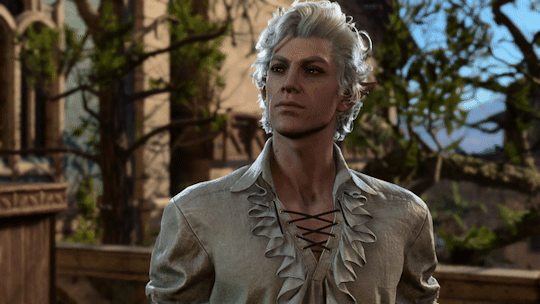
Which brings me to Baldur's Gate 3 and the thing that a lot of people have noticed: The other Baldur's Gate games - as well as some of the other games releasing around 2000 - had their own tie-in novels going into the characters, their background, but also what they were doing in the future.
Something that so far BG3 has not done, which some fans have already critized. Because a lot of people have actually gotten really invested into those characters. A lot of the kind of people especially who so far are underserved by a lot of the tie-in stuff: Queer and generally diverse audiences.
Like, I think there would be a lot of people, who totally would read a novel, about...
Astarion getting drawn into some sort of political intrigue in Baldur's Gate while serving Cazador
Karlach's time in Avernus
Some Adventure Wyll got dragged into while being the Blade of the Frontier.
Shadowheart going onto a mission for Shar (maybe together with Nocturne)
Whatever Gale was doing during the Second Sundering
Lae'zel's youth among the Githyanki
The Dark Urge and Gortash starting up the entire conspiracy
... whatever Halsin had been up to in his long live
Heck, people would eat that stuff up. And you could not only use it to worldbuild but also once more create some access into the world and what happened there. And they are kinda wasting a lot of potential by not bringing out those novels.
Of course, there is one big problem: BG3 makes it kinda hard to write about anything happening after the ending. Because as it is right now, someone is gonna be pissed if a novel set after the game does not go with the decision for a character they go for. Like, Ascended Astarion fans are gonna be pissed, if they go with Spawn Astarion - and the other way around. Same goes with every other character where you have those big decisions happening.
This is something they will have to tackle eventually if they plan on doing something with the characters in the future (no matter if we are talking Larian or WotC), but it is definitely an issue that just arises from the structure of the game.
Bonus of course is, that you just cannot define a canonical Tav. But without a Tav, you also gotta act as if the story of the game happened without a Tav, which still is not ideal. I am honestly not sure with how they are gonna deal with this on the long run.
Access via Characters
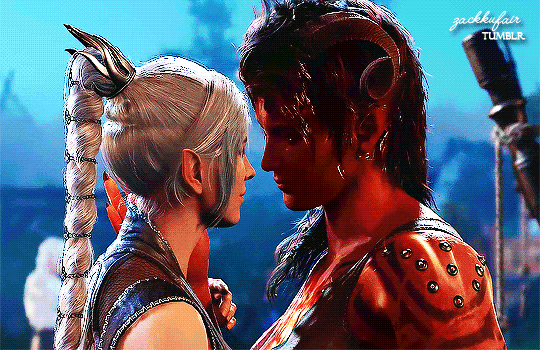
Alright, but what is the actual issue here?
Well, basically there are two hurdles to overcome for the accessibility of the lore. The first is the physical accessibility - aka, what I talked about in the last long blog post. The second meanwhile is more related to making the lore engaging. And that happens through characters.
It is for me what happened last year. I actually tried to engage with the lore as the movie came out - but only when BG3, that tied a lot more into the actual lore was released I actually found proper access to the lore. Because I had concrete things I could now look for because the game hinted at so much both through characters and major story events happening.
Here is the thing: If you just have the lore on its own, it is about as engaging as reading a history book. Sure, as your local history nerd I find reading history books fun, but most people really do not want to read a history book to engage with a hobby.
People will however engage with stories and characters that interest them. Which is where we get back to the thing I talked about at the beginning: Right now most canonical novels and stories still cater to an audience that is male, cishet, white and also, let's be frank, definitely over 30 years old. Leaving behind a lot of potential fans that theoretically make up a big part of the player-base, but actually do not engage a lot with the lore for this exact reason.
Look. DnD right now is fairly close to being an actual mainstream hobby, due to the recent proliferation of formerly nerdy stuff. And yet WotC is bleeding money, especially in regards of DnD.
If you ask me, sure... DnD should go into public domain. But it doesn't. And given that there are so many creative, skilled people working on this - no matter how dumb Hasbro is and how shitty of an employer they are - I actually do want them to succeed. I have really become engaged with this world now. And I think it is a pity that they clearly do not know how to market this stuff.
#dungeons & dragons#baldurs gate 3#dnd#baldur's gate 3#bg3#dungeons & dragons: honor among thieves#honor among thieves#dnd:hat#tie in#novels#dnd lore#accessibility#astarion#karlach#shadowheart#wyll ravengard#halsin#gale dekarios#lae'zel#elminster#drizzt do'urden#edgin darvis#holga kilgore#wizards of the coast#wotc#star wars#league of legends
153 notes
·
View notes
Text
Tech workers and gig workers need each other
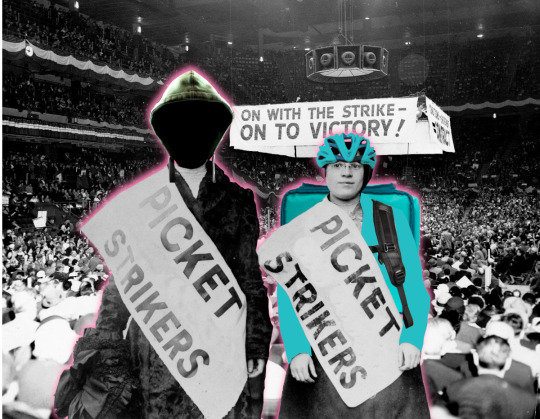
Catch me in Miami! I'll be at Books and Books in Coral Gables on Jan 22 at 8PM.

We're living in the enshittocene, in which the forces of enshittification are turning everything from our cars to our streaming services to our dishwashers into thoroughly enshittifified piles of shit. Call it the Great Enshittening:
https://pluralistic.net/2023/11/09/lead-me-not-into-temptation/#chamberlain
How did we arrive at this juncture? Is it the end of the zero rate interest policy? Was it that the companies that formerly made useful things that we valued underwent a change in leadership that drove them to make things worse? Is Mercury in retrograde?
None of the above. There have been many junctures in which investors demanded higher returns from firms but were not able to force them to dramatically worsen their products. Moreover, the leaders now presiding over the rapid unscheduled disassembly of once-useful products are the same people who oversaw their golden age. As to Mercury? Well, I'm a Cancer, and as everyone knows, Cancers don't believe in astrology.
The Great Enshittening isn't precipitated by a change in how greedy and callous corporate leaders are. Rather, the change is in what those greedy, callous corporate leaders can get away with.
Capitalists hate capitalism. For a corporate executive, the fact that you have to make good things, please your customers, pay your workers, and beat the competition are all bugs, not features. The best business is one in which people simply pay you money without your having to do anything or worry that someday they'll stop. UBI for the investor class, in other words.
Douglas Rushkoff calls this "going meta." Don't sell things, provide a platform where people sell things. Don't provide a platform, invest in the platform. Don't invest in the platform, buy options on the platform. Don't buy options, buy derivatives of options.
A more precise analysis comes from economist Yanis Varoufakis, who calls this technofeudalism. Varoufakis draws our attention to the distinction between profits and rents. Profit is the income a capitalist receives from mobilizing workers to do something productive and then skimming off the surplus created by their labor.
By contrast, rent is income a feudalist derives from simply owning something that a capitalist or a worker needs in order to be productive. The entrepreneur who opens a coffee shop earns profits by creaming off the surplus value created by the baristas. The rentier who owns the building the coffee shop rents gets money simply for owning the building.
The coffee shop owner can never rest. At any moment, another coffee shop can open down the street and lure away their customers and their baristas. When that happens, the coffee shop goes bust and the owner is ruined. But not the landlord! After the coffee shop goes bust, the landlord's asset is more valuable – an empty storefront just down the street from the hottest coffee shop in town.
Capitalists hate capitalism. Faced with a choice of retaining their workers by paying them a fair wage and treating them well, or by saddling them with noncompetes that make it impossible to work for anyone else in the same field, and obligations to repay tens of thousands of dollars for "training" if they quit, bosses will take the latter every time. Go meta, baby.
Same for competition. Faced with the choice of competing to win the most customers with the best products, or merging so that customers have nowhere else to go, even the bitterest of rivals find it remarkably easy to intermarry until our corporations landscape is so interbred the dominant firms all have Habsburg jaws. Think: Facebook-Instagram. Disney-Fox. Microsoft-Activision:
https://locusmag.com/2021/07/cory-doctorow-tech-monopolies-and-the-insufficient-necessity-of-interoperability/
Enshittification has complex underlying dynamics and a reliable procession of stages, but the effect is quite straightforward: things are enshittified when they become worse for the people who use them and the suppliers who makes them, but nevertheless, the users keep using and the suppliers keep supplying.
There are four forces that stand in the way of enshittification, and as each of these forces grows weaker, enshittification proliferates.
The first and most important of these constraints is competition. Capitalists claim to love competition because it keeps firms sharp: they must constantly find ways to improve products and cut costs or be swept away by a superior alternative. There's a degree of truth here, but that's not the whole story.
For one thing, competition can "improve" things that we would rather see abolished. Critics of the GDPR, the EU's landmark privacy law, often point to the devastation that enforcing privacy law had on the European ad-tech industry, driving small firms out of business. But these firms were the most egregious privacy offenders, because they had the least to lose, lacking the dominant position of US-based Big Tech surveillance companies.
Having the least to lose, they were the most reckless with their privacy invasions – but they were also the least equipped to pay expensive enablers from giant corporate law firms to hold off European enforcers, and so they were obliterated. The resulting lack of competition is fine, as far as privacy goes: we don't want competition in the field of "who is most efficient at violating our human rights":
https://www.eff.org/deeplinks/2021/04/fighting-floc-and-fighting-monopoly-are-fully-compatible
But there's another benefit to competition: disorganization. A sector with hundreds of medium-sized, competing companies is a squabbling mob, incapable of agreeing on the site for an annual meeting. An industry dominated by a handful of firms is a cartel, handily capable of presenting a unified front to policy makers, and their commercial coziness provides them with vast war-chests they can use to suborn governments and capture their regulators:
https://pluralistic.net/2022/06/05/regulatory-capture/
Competition is the first constraint. When there's competition, corporate managers fear that you will respond to enshittification by defecting to a rival, costing them money. They don't care about your satisfaction, but they do care about your money, and competition hitches their ability to satisfy you to their ability to get paid by you.
Competition has been circling the drain for 40 years, as the "consumer welfare" theory of antitrust, hatched by Reagan's court sorcerers at the University of Chicago School of Economics, took hold. This theory insists that monopolies are evidence of "efficiency" – if everyone shops at one store, that's evidence that it's the best store, not evidence that they're cheating.
For 40 years, we've allowed companies to violate antitrust law by merging with major competitors, acquiring fledgling rivals, and using investor cash to sell below cost so that no one else can enter the market. This has produced the inbred industrial hulks of today, with five or fewer firms dominating everything from eyeglasses to banking, sea freight to professional wrestling:
https://www.openmarketsinstitute.org/learn/monopoly-by-the-numbers
The endless and continuous weakening of competition has emboldened corporate enshittifiers, who operate on the logic of Lily Tomlin in her role as an AT&T spokeswoman: "We don't care. We don't have to. We're the phone company":
https://vimeo.com/355556831
But the drawdown of competition has also enabled regulatory capture, by converting cutthroat adversaries to kissing cousins. These companies have convinced their regulators not to enforce privacy, consumer protection or labor laws, provided that the gross violations of these laws are accomplished via apps.
This is where tech exceptionalism is warranted: while the bosses that run these companies aren't any nobler – or more wicked – than the Robber Barons of yore, they are equipped with a digital back-end for their businesses that let them change the rules of the game from moment to moment.
Think of labor law: as Veena Dubal writes, gig-work companies practice algorithmic wage discrimination, turning your paycheck into a slot machine that pays out more when you are more selective about which jobs you take, and which then docks your pay by tiny increments as you become less discriminating about answering the app's call:
https://pluralistic.net/2023/04/12/algorithmic-wage-discrimination/#fishers-of-men
This is a plain violation of labor law, but the fiction that gig workers are contractors, combined with the opacity and speed of the wage discrimination back-end, lets the companies get away with it.
But the monsters who hatched this scam are no worse than their forebears, nor are they any smarter. Any black-hearted coal-boss memorialized in a Tennessee Ernie Ford song would have gladly practiced algorithmic wage discrimination – but there just weren't enough green-eyeshade accountants in the back office to change the payout from second to second.
I call this "twiddling" – turning the knobs on the back end to continuously adjust the business logic that the firm operates on:
https://pluralistic.net/2023/02/19/twiddler/
Twiddling is everywhere, and it is only possible because "it's not a crime if we use an app" has been accepted by (captured) regulators. Think of Amazon's "pricing paradox," where deceptive search results – which Amazon makes $38b/year on – allow the company to offer lower prices, but charge higher ones:
https://pluralistic.net/2023/11/06/attention-rents/#consumer-welfare-queens
The first constraint on enshittification is competition – the fear that you'll lose money when a disgusted customer take their business elsewhere. The second constraint is regulation – the fear that a regulator's punishment will eat up all the expected gains from an enshittificatory move, or even exceed those gains, leading to a net loss.
But the less competition there is in a sector, the easier it is for the remaining companies to capture their regulators. Say goodbye to that second constraint.
But there's another constraint – another one that's unique to technology, and genuinely exceptional. That's self-help. Digital technology is infinitely flexible, which is why managers can twiddle the business logic and change the rules on a dime.
But it's a double-edged sword. Users can twiddle back. The universal nature of digital products means it's always technically possible to disenshittify the enshittified products in your world. Mercedes wants to charge you rent on your accelerator pedal via a monthly subscription? Just mod the car by toggling the "subscription paid" bit and get the accelerator for free:
https://pluralistic.net/2023/07/24/rent-to-pwn/#kitt-is-a-demon
HP tricks you into installing a "security update" that sneakily disables your printer's ability to recognize and use third-party ink? Just roll back the operating system and you won't be forced to spend $10,000/gallon to print out your boarding passes and shopping lists:
https://www.eff.org/deeplinks/2020/11/ink-stained-wretches-battle-soul-digital-freedom-taking-place-inside-your-printer
Self-help – AKA "adversarial interoperability" – isn't just a way to override the greedy choices of corporate sadists. It's a way to hold those sadists in check. It's a constraint.
Imagine a boardroom where someone says, "I calculate that if we make our ads 25% more invasive and obnoxious, we can eke out 2% more in ad-revenue." If you think of a business as a transhuman colony organism that exists to maximize shareholder value, this is a no-brainer.
But now consider the rejoinder: "If we make our ads 25% more obnoxious, then 50% of our users will be motivated to type, 'how do I block ads?' into a search engine. When that happens, we don't merely lose out on the expected 2% of additional revenue – our income from those users falls to zero, forever."
Self-help is the third constraint on enshittification. But when competition fails, and regulatory capture ensues, companies don't just gain the ability to flout the law – they get to wield the law, too.
Tech firms have cultivated a thicket of laws, rules and regulations that make self-help measures very illegal. This thicket is better known as "IP," a term that is best understood as meaning "any policy that lets me control the conduct of my competitors, my customers and my critics":
https://locusmag.com/2020/09/cory-doctorow-ip/
To put an ad-blocker in an app, you have to reverse-engineer it. To do that, you'll have to decrypt and decompile it. That step is a felony under Section 1201 of the DMCA, carrying a five-year prison sentence and a $500,000 fine. Beyond that, ad-blocking an app would give rise to liability under the Computer Fraud and Abuse Act (a law inspired by the movie Wargames!), under "tortious interference" claims, under trademark, copyright and patent.
More than 50% of web users have installed an ad-blocker:
https://doc.searls.com/2023/11/11/how-is-the-worlds-biggest-boycott-doing/
But zero percent of app users have installed an ad-blocker, because they don't exist, because you'd go to prison if you made one. An app is just a web-page wrapped in enough IP to make it a felony to add an ad-blocker to it.
This is why self-help, the third constraint, no longer applies. When a corporate sadist says, "let's make ads 25% more obnoxious to get 2% more revenue," no one says, "if we do that, our users will all install blockers." Instead, the response is, "let's make ads 100% more obnoxious and get an 8% revenue boost!"
https://www.theverge.com/2023/6/16/23763227/uber-video-advertising-ads-taxi-food-delivery-apps
Which brings me to the final constraint: workers.
Tech workers have historically enjoyed enormous bargaining power, thanks to a dire shortage of qualified personnel. While this allowed tech workers to command high salaries and cushy benefits, it also led many workers to conceive of themselves as entrepreneurs-in-waiting and not workers at all.
This made tech workers very exploitable: their bosses could sell them on the idea that they were doing something heroic, which warranted "extremely hardcore" expectations – working 16 hour days, sleeping under your desk, sacrificing your health, your family and your personal life to meet deadlines and ship products ("Real artists ship" – S. Jobs).
But the flip side of this appeal to heroism is that it only worked to the extent that it convinced workers to genuinely care about the things they made. When you miss you mother's funeral and pass on having kids in order to meet deadline and ship a product, the prospect of making that product worse is unthinkable.
Confronted by the moral injury of enshittifying a product you care about, and harming the users you see yourself as representing, many tech workers balked at the prospect. Because tech workers were scarce – and because there were plenty of employment prospects for workers who quit – they could actually prevent their bosses from making their products worse:
https://pluralistic.net/2023/11/25/moral-injury/#enshittification
But those days are behind us, too. Mass tech worker layoffs have gutted tech workers' confidence. When Google lays off 12,000 tech workers just months after a stock buyback that would have paid their wages for the next 27 years, they deliver two benefits to their shareholders. It's not just the short-term gains from the financial engineering – there's the long-term gain of gutting worker power and stripping away the final impediment to enshittification:
https://pluralistic.net/2023/09/10/the-proletarianization-of-tech-workers/
No matter how strong an individual tech worker's bargaining power was, it was always brittle. Long before googlers were being laid off in five-digit cohorts, they were working in an environment where harassment and predation were just part of the job. The 20,000+ googlers who walked off the job in 2018 were an important step towards replacing the system where each tech worker's power was limited to their moment-to-moment importance to their bosses' plans with a new system based on a collective identity.
Only through collective action and solidarity – unions – could tech workers hope to truly resist all the moral injuries of their bosses enshittification imperatives. No surprise then, that tech unions are on the rise:
https://abookapart.com/products/you-deserve-a-tech-union
But what is a little surprising – and very heartening! – is what happens when techies start to self-identify as workers: they come to understand that they share common cause with the other workers at the bottom of the tech stack. Think of Amazon's tech workers walking out in solidarity with Amazon's warehouse workers:
https://gizmodo.com/tech-workers-speak-out-in-support-of-amazon-warehouse-s-1842839301
Superficially, the bottom rank of the tech industry is as different from the tech workers at the top as you can imagine. Tech workers are formally employed, with stock options, health care and theme-park "campuses" with gyms and gourmet cafeterias.
The gig workers who pack, drive, deliver and support tech products aren't even employees – they're misclassified as contractors. They don't get free massages – they get AI bosses that monitor their eyeballs and dock their paychecks for peeing:
https://pluralistic.net/2024/01/11/robots-stole-my-jerb/#computer-says-no
Gig workers desperately need unions, but they also derive extraordinary benefits from self-help measures. When an app is your boss, another app can make all the difference to your working conditions. Take Para, an app that fights algorithmic wage discrimination by allowing gig workers to collectively and automatically refuse any job where the pay is below a certain threshold, forcing the algorithm to pay everyone more:
https://www.eff.org/deeplinks/2021/08/tech-rights-are-workers-rights-doordash-edition
Para is fighting a grim legal and technical battle against companies like Doordash, whose margins depend on atomized workers with atomized apps, prohibited from countertwiddling. This is a surprisingly effective tactic: in Indonesia, gig workers co-ops create suites of "tuyul" apps that modify the behavior of their bosses' apps', unilaterally securing concessions that they lack the bargaining power to secure by other means:
https://pluralistic.net/2021/07/08/tuyul-apps/#gojek
Tuyul apps and other forms of countertwiddling aren't a substitute for unionization, they're an adjunct to it. The union negotiator whose rank-and-file are able to modify the apps that monitor and control their working conditions operates from a position of strength. "Please give my members more bathroom breaks" is a lot weaker than, "If you want my members to stop hacking their apps so they can piss when they need to, you're going to have to give them official bathroom breaks."
This is where solidarity between the high-paid tech workers at the keyboard and low-paid tech workers on the delivery bikes comes in. Together, they can wring more concessions from their bosses, sure. But unionized coders can give their unionized delivery riders the apps they need to countertwiddle and increase the bargaining leverage of all the workers in the union. And when unionized coders' bosses force them to put enshittifying anti-features in the apps they care about, unionized front-line workers can run counter-apps that disenshittify them.
Other sectors are already working through versions of this. The ouster of the old corrupt leadership of the Teamsters ushered in a new, radical era that produced historic wage and working condition gains for drivers and the abolition of the two-tier contract system that eventually destroys any union that tries it.
That change in leadership was possible because the Teamsters organized the Harvard Grad Students, and those Harvard kids memorized the union rulebook. At the historic conference where the old guard was abolished, it was teamwork between the union rank-and-file and the rules-lawyers from Harvard that turned the proceedings around:
https://theintercept.com/2023/04/07/deconstructed-union-dhl-teamsters-uaw/
We are deep into the enshittocene and it is terribly demoralizing. But by understanding the constraints that kept enshittification at bay, we can rebuild them, and shore them up. Labor organizing among all kinds of tech workers isn't just a way to get a better deal for those workers – it's key to the disenshittification of all our lives.

I'm Kickstarting the audiobook for The Bezzle, the sequel to Red Team Blues, narrated by @wilwheaton! You can pre-order the audiobook and ebook, DRM free, as well as the hardcover, signed or unsigned. There's also bundles with Red Team Blues in ebook, audio or paperback.

If you'd like an essay-formatted version of this post to read or share, here's a link to it on pluralistic.net, my surveillance-free, ad-free, tracker-free blog:
https://pluralistic.net/2024/01/13/solidarity-forever/#tech-unions
#pluralistic#jennifer abruzzo#labor#tech unions#tech layoffs#enshittification#para#tuyul apps#solidarity#union density
245 notes
·
View notes